

LEGACY




/September 15, 2025





SUITE TREAT
Step into a world of opulence when you book a Suite at Raffles Doha.
Experience the added luxury of QAR 750 credit to spend on dining in the hotel, and QAR 500 towards any Spa treatment.
Children aged 12 and below are welcome to indulge in the enchantment of complimentary dining.
Rates starting from QAR 3,500 per night
For reservations, please call +974 4030 7100 or email reservations.doha@raffles.com
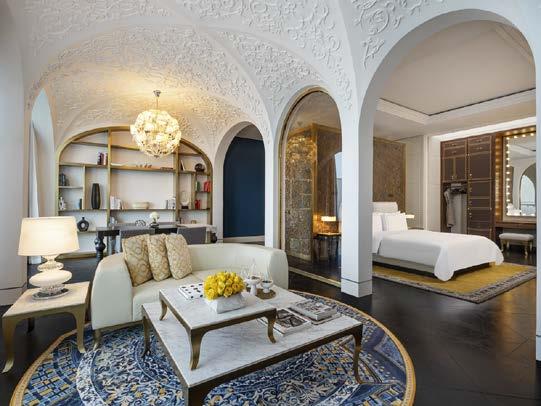
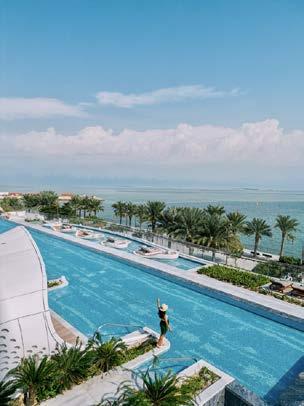




September 15, 2025

BUSINESS UNUSUAL
P.15 The People’s Vanguard
KAWA JUNAD, founder of Iraq’s first digital bank, on driving innovation to improve lives.
P.20 The Walk With Raffa RAFFAELLA CAMPAGNOLI talks with Andrea Fornari, Head of GCC Export, at EssilorLuxottica.
P.32 The Recap
All the highlights from this year’s SUSTAINABILITY INNOVATION AWARDS by BNC Publishing.
P.40 Miori by the Sea
A coastal world shaped by salt, light, and effortless belonging.
P. 50 Building a Greener IMEA Region
In conversation with STEFAN SCHMIED, Leader of LIXIL International’s IMEA region
→ Kanessa Muluneh is the founder of Rise of Fearless, a UAE-based mobile gaming platform that merges African storytelling with immersive battle royale gameplay.
STARTUP FUNDING
P.55 Investor Insights Every Entrepreneur Needs
P.56 NOOR SWEID, Author and Founder and Managing Partner at Global Ventures
P.57 SHANE SHIN, Founding Partner, Shorooq
P.58 EKTA TOLANI, Chief Investment Officer, KBW Ventures
P.59 ABOUDI AL-QATTAN, Principal, DASH Ventures
P.60 ALI A. ABUSSAUD, CEO, Hala VC
P.61 AMJAD AHMAD, Managing Partner, 500 Global
P.62 BASIL MOFTAH, Managing Partner, Key Capital
P.63 HASAN HAIDER, Founder and Managing Partner, Plus VC
CEO Wissam Younane wissam@bncpublishing.net
MANAGING DIRECTOR Rabih Najm rabih@bncpublishing.net
ART DIRECTOR Simona El Khoury
EDITOR IN CHIEF Anil Bhoyrul anil@bncpublishing.net
MANAGING EDITOR Tamara Pupic tamara@bncpublishing.net
FEATURES EDITOR Aalia Mehreen Ahmed aalia@bncpublishing.net
DIRECTOR OF INNOVATION
Sarah Saddouk sarah@bncpublishing.net
GROUP SALES DIRECTOR – B2B GROUP Joaquim D’Costa jo@bncpublishing.net
HEAD OF PARTNERSHIPS Samir Glor Samir@bncpublishing.net
COMMERCIAL LEAD
Anna Chipala anna@bncpublishing.net
COLUMNIST Tamara Clarke
CONTRIBUTING WRITERS
Justin Harper, Raffaella Campagnoli, Seymone L. Moodey, and Fida Chaaban.
SUBSCRIBE
Contact subscriptions@bncpublishing.net to receive Entrepreneur Middle East every issue
COMMERCIAL ENQUIRIES sales@bncpublishing.net
ENTREPRENEUR.COM
Access fresh content daily on our website
PO BOX 502511 DUBAI, UAE P +971 4 4200 506 EntMagazineME Entrepreneur-me

Enlighten Your Eternal Beauty, Inside and Out!
@muarjewels www.muarjewels.com
info@muarjewels.com
DRIVERLESS DELIVERY IS ABOUT TO TRANSFORM THE UAE ECONOMY
Why autonomous vehicles will redefine business and consumer convenience in the Emirates

I’ve lived in the UAE long enough to see the country embrace ambitious ideas that many thought impossible. From skyscrapers piercing the clouds to global financial hubs sprouting from desert sands, innovation is in our DNA. Now, the next wave is rolling in: driverless delivery vehicles. Within a year, they’re expected to hit UAE streets, and I believe the impact will be nothing short of revolutionary.
Let’s start with business. Logistics costs remain one of the largest burdens for e-commerce players and SMEs. In the UAE, last-mile delivery accounts for up to 53% of total shipping expenses, according to global consulting data. By removing human driver salaries, downtime, and inefficiencies, autonomous fleets can cut those costs by as much as 30–40%, freeing capital for growth. Imagine what that means for a small retailer in Sharjah or a food startup in Abu Dhabi: suddenly, scaling isn’t a financial cliff—it’s an achievable milestone.
The benefits ripple outward. Autonomous vehicles don’t sleep. They can deliver around the clock, reducing bottlenecks during peak times like Ramadan or shopping festivals. For consumers, this means faster, more reliable service. Studies show that in urban pilots globally, delivery windows shrank from an average of 90 minutes to under 30 minutes once autonomous tech was deployed. For a country obsessed with efficiency and convenience, this is a game-changer.
Environmental impact is another dimension we can’t overlook. Most of the UAE’s upcoming fleets will be electric. The Ministry of Energy and Infrastructure has already committed to cutting transport emissions by 40% by 2050. Driverless electric deliveries dovetail perfectly with that vision, helping businesses meet sustainability targets while appealing to eco-conscious consumers.
Sceptics point to safety and regulation, but the UAE has a track record of moving fast while maintaining world-class standards. Masdar City’s ongoing trials prove the technology is not only feasible but welcomed by communities eager for smart solutions. If any country can leapfrog into a driverless future, it’s ours.
For entrepreneurs, the lesson is clear: prepare now. Whether you run a restaurant, a fashion label, or a logistics platform, autonomous delivery is no longer science fiction—it’s a near-term competitive advantage. Those who adapt quickly will capture new markets and customer loyalty; those who don’t may struggle to keep pace.
In a land that thrives on ambition, driverless delivery is more than a technology upgrade—it’s a catalyst for a more efficient, sustainable, and customer-centric economy.
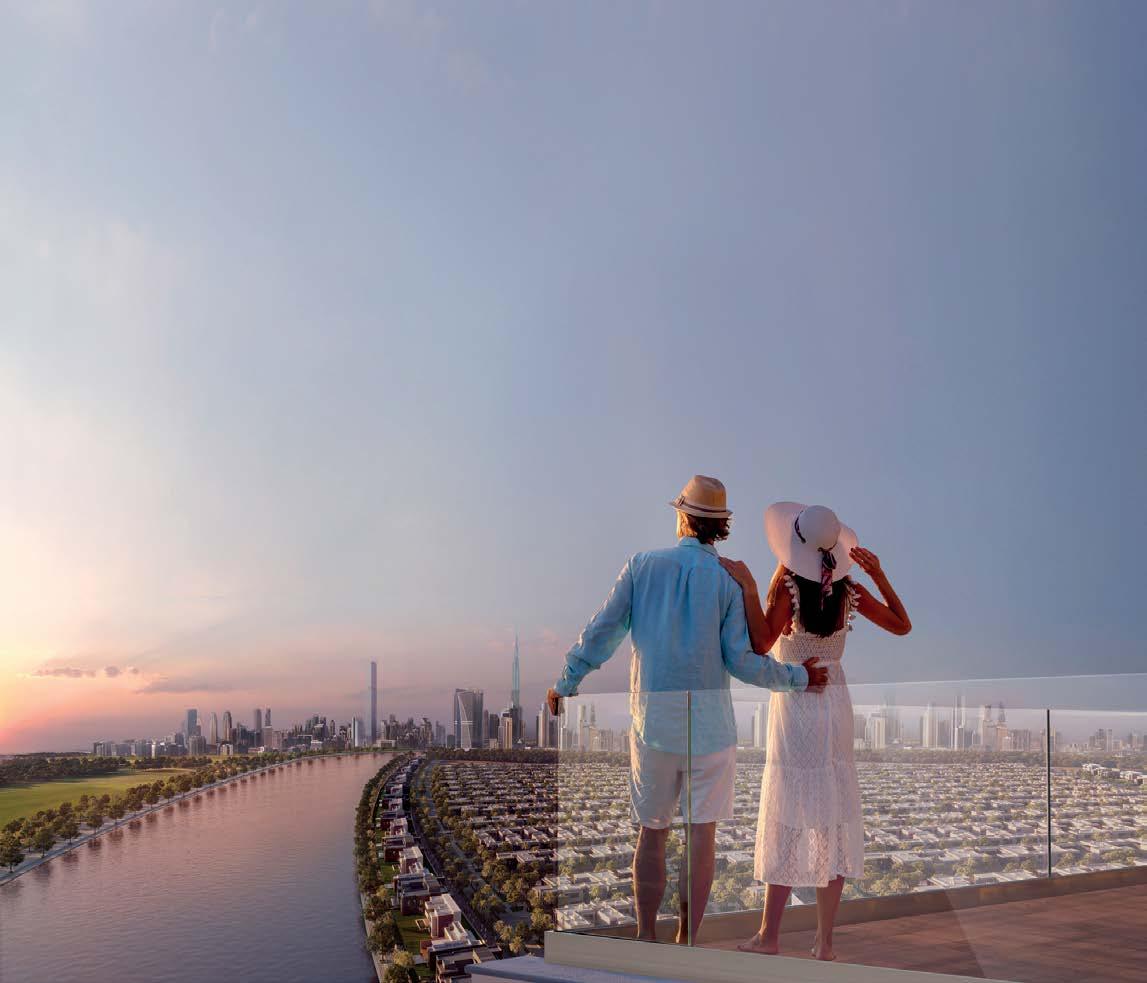
Anil Bhoyrul Editor-in-Chief








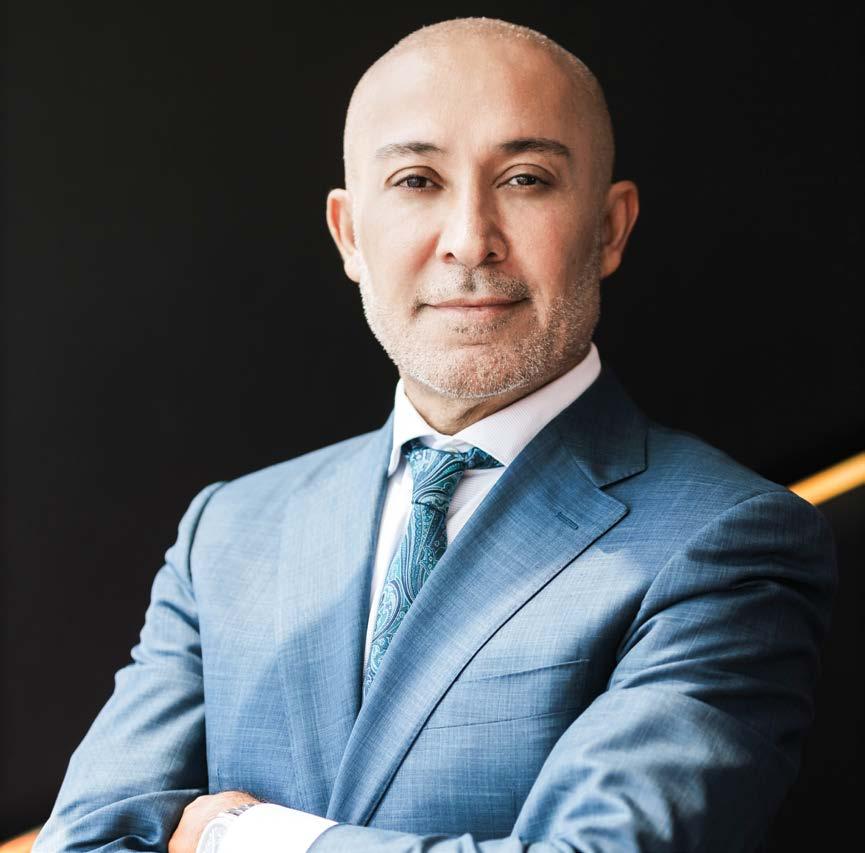
The People’s Vanguard
Having grown up in a war-torn Iraq, Kawa Junad understood the necessity for digital innovation from a tender age. Yet as the founder of the nation’s first digital bank, he refuses to be led by trends—for him, every decision is rooted in a singular purpose: improving the lives of his people. by AALIA MEHREEN AHMED
→ Kawa Junad is the founder and Chairman of First Iraqi Bank, Iraq’s first fully digital bank which was launched in 2020.
Much before Kawa Junad became known as the founder of Iraq’s first digital bank, First Iraqi Bank (FIB), he had other “firsts” associated with his name: in 2007 he launched his first telecom platform, Newroz Telecom; which offered ADSL and established the first direct connection between Iraq and the international fiber network. In 2013, his next telco, Fastlink, launched 4G LTE when the entire country was still on 2G. Fastlink went on to be recognized as the Middle East’s first advanced 4G LTE network.
“When I first entered telecommunications in the early 2000s, Iraq’s infrastructure had been devastated,” Junad recalls. “Internet penetration was around 1%, and most of the country relied on outdated or unreliable connections. Many people thought modern connectivity in Iraq was impossible. But, as an entrepreneur, I saw the potential and pushed ahead. I invested my own money in satellite phones, giving many Iraqis their first access to a reliable international calling service. We built the first interconnection between Iraq and the global fiber network through Turkey, and then launched the first 4G LTE network in the country. It wasn’t just a technological leap — it allowed Iraq to skip an entire generation of telecom development, moving from 2G straight to 4G. That decision to bypass legacy systems was risky, but it kept us ahead of competitors and proved transformative. It played a major role in economic and social growth, giving people access to information, communication, and new opportunities.”

→ The vision behind FIRST IRAQI BANK was simple but ambitious: to build a financial ecosystem that could move Iraq from a cash-heavy society into a modern, digital-first economy. While traditional banks in Iraq often come with bureaucracy, delays, and high fees, FIB eliminated many of these inefficiencies from day one.

This feat, however, did not mark Junad’s foray into telecommunications, or indeed the world of business itself. “One of my earliest projects, long before mobile networks and digital banking, was opening telephone service centers in Iraq,” he shares. “At the time, there were no landlines or personal connections, so these centers became lifelines — places where people could come and make calls to loved ones abroad. That experience showed me how even small steps in communication technology could completely change lives. After relocating to the UK in the mid-1990s, my very first job was exporting goods to Iraq. It was far from glamorous, but it gave me clarity. It showed me that routine work without impact was not for me. I wanted to build, to innovate, and to solve problems at scale — and that realization pushed me firmly toward entrepreneurship.”
By 2016, having already played a pivotal role in transforming Iraq’s telecommunications landscape, Junad had found his next project—and another “first” in his career: Iraq’s first mobile wallet, FastPay, which offered a simple, safe, and fast way to transact digitally. “The move into fintech came from observing a painful reality: Iraq was — and still largely is — a cash-based society,” Junad says. “Millions of people were excluded from formal financial services. But the success of FastPay showed us how hungry people were for modern financial solutions. That was actually
the foundation for First Iraqi Bank. FastPay addressed payments, but Iraq also needed a full-fledged digital bank that could issue IBANs, enable cross-border transactions, and provide a wider ecosystem of services. That’s how First Iraqi Bank was born.”
Indeed, while FastPay offered Junad a foot in the door, it was the launch of
“
First Iraqi Bank in 2020 that brought to fruition his vision to create a full-fledged financial ecosystem for Iraq. “Iraq doesn’t just need another bank– it needs an entire ecosystem that connects people, businesses, and institutions,” Junad explains. “A neobank typically offers limited digital services on top of existing financial infrastructure. FIB was built differently — we integrated
Iraq has never been an easy place to innovate — whether in telecoms or finance — but I have always believed that challenges are opportunities in disguise. My guiding principle has been to build for the future, not just for today. It is important to keep up with modernity when it comes to technology, because it advances quickly.”

compliance, payments, mobile-first solutions, and cross-border capabilities into one platform. For many Iraqis, FIB is not just their first digital bank account, but their first ever bank account. That comes with a responsibility to go beyond transactions, to offer financial literacy, digital trust, and broader access. We also work with businesses and government ministries, digitizing everything from salary disbursements to vendor payments. By supporting individuals, enterprises, and institutions alike, FIB’s ecosystem helps across all aspects of the economy — from household finances to national digital transformation.”
For FIB to thus successfully help transition Iraq from a cash-dependent society to a digital-first economy, Junad notes that financial inclusivity will be a key area of focus. “Today, customers can open accounts remotely using advanced biometric technology — including selfie identification and facial recognition — that links directly to national ID systems,” he says. “But beyond simplifying onboarding, we have invested heavily in awareness campaigns and digital literacy programs. Our app is available in Arabic, Kurdish, and English, with interfaces designed for first-time users. We’ve also partnered with government institutions to digitize salary payments, which brings millions of public-sector workers into the digital ecosystem. And we continue to expand merchant networks, so people can use FIB

FOR MANY IRAQIS, FIB IS NOT JUST THEIR FIRST DIGITAL BANK ACCOUNT, BUT THEIR FIRST EVER BANK ACCOUNT. THAT COMES WITH A RESPONSIBILITY TO GO BEYOND TRANSACTIONS, TO OFFER FINANCIAL LITERACY, DIGITAL TRUST, AND BROADER ACCESS.”
in their daily lives — from paying bills to shopping to sending money to relatives.”
Having been at the forefront of so many pioneering ideas, Junad makes his endeavors seem effortless. But he quickly quells any such notion. “Iraq has never been an easy place to innovate — whether in telecoms or finance — but I have always believed that challenges are opportunities in disguise,” he says. “My guiding principle has been to build for the future, not just for today. It is important to keep up with modernity when it comes to technology, because it advances quickly. Skipping generations and legacy systems carries risks, but it pays off and keeps you ahead of competitors. That’s exactly what we did in Iraq by leaping from 2G to 4G directly. And I must say — Iraqi citizens themselves are advanced and willing to learn
“
Many people thought modern connectivity in Iraq was impossible. But, as an entrepreneur, I saw the potential and pushed ahead. I invested my own money in satellite phones, giving many Iraqis their first access to a reliable international calling service. We built the first interconnection between Iraq and the global fiber network through Turkey, and then launched the first 4G LTE network in the country.”
new things. It is their drive and willpower that push me forward, even in the toughest of times.”
Junad’s determination to do better for the sake of his people, however, isn’t a newfound sentiment. “I grew up in Dohuk in the Iraqi Kurdistan region– it was the 1980s, the country was at war, and it was a time of great difficulty,” he says. “Those early years shaped my perspective — I saw firsthand how lack of infrastructure held back opportunities for an entire generation. When I later migrated to the UK and became exposed to powerful technologies that allowed for seamless communication, I knew immediately: this is what Iraq needs. That conviction became the foundation for my career. From a young age, I leaned towards science and technology because I saw them as tools to rebuild and advance society.”
It is that mindset that has continued to dictate Junad’s decision-making, even as global digital trends seek quick results and quicker idea iterations. “It’s very easy to get distracted by “the next big thing” in technology, but my vision has always been rooted in relevance and impact,” Junad asserts. “I ask one question before investing in any innovation: Will this improve the lives of people in Iraq and beyond? For example, it wasn’t enough to just build 4G networks — we had to make them accessible and affordable. Similarly, with
financial technology, it wasn’t enough to launch digital products; we had to ensure people trusted them and could use them in their everyday lives. That focus on practical, human-centered impact has kept me grounded while embracing global tech trends.”
Today, with FIB having been operational for a little over five years already, Junad has been able to witness more closely how his concerted, people-first efforts have paid off yet again. “There are countless moments that remind me why we built FIB, but two stories in particular stay with me,” he says. “Once, one of my FIB employees was at a market and overheard a small child begging her mother for toys. The mother gently replied, “Honey, I’m sorry, I don’t have money.” The girl immediately replied, “That’s okay, Mom, you have FIB.” Hearing that made me smile — for her, FIB wasn’t just a bank, it was something that gave her family a source of possibilities. My colleague was so touched that he bought the toys himself.”
The second anecdote is more personal, says Junad. “A close friend of mine, living overseas, once faced a family emergency in Iraq,” Junad shares. “His relatives needed urgent medical treatment, and in the past, sending funds would have been a long and stressful process. But with FIB, he was able to transfer money instantly, and that speed quite
literally saved a life. And beyond these individual stories, what I love seeing is how small business owners are using FIB to accept digital payments for the first time. They can track their income, manage their expenses, and feel more in control of their businesses. For them, it’s not just about new technology — it’s about real opportunities to grow.”
Having thus solidified FIB’s impact, Junad now hopes to take the bank’s services beyond the borders of Iraq. “For FIB, the next chapter is international,” Junad declares. “We’ve already started expanding our digital infrastructure beyond Iraq, and we envision FIB as a crossborder fintech enabler across the region. Just as FIB has been leading in both services and technology in Iraq, the Gulf has been doing the same within the international financial context. Partnering with or moving into the GCC is a natural extension of what we’ve been doing
since inception. We love working with partners who natively push the technological limits to provide a better experience for their customers, and we look forward to doing the same abroad.”
“As for myself, I remain committed to building solutions for the future — whether in fintech, telecom, or new frontiers yet to be defined,” he adds, on an ending note. “I also dedicate more of my time to philanthropy, particularly in education and digital literacy, because the future we are building needs empowered people as much as it needs advanced technology.”
↓ By removing onboarding barriers, FIB has helped rebuild trust in the financial system and encouraged both individuals and businesses to participate in the formal economy. The speed, security, and transparency of these processes aim to give Iraq a financial foundation that regulators and international partners can have confidence in.

The Walk With Raffa: Vision ReimaginedSee More, Be More
Raffaella Campagnoli talks with Andrea Fornari, Head of GCC Export, at EssilorLuxottica.
by RAFFAELLA CAMPAGNOLI
See More, Be More: The Purpose Behind our Products.
The showroom is displaying frames and showing an integrated ecosystem: the path connecting the dots between health, welbeing, design, and individual’s identity. “Our mission is to empower humanity,” Andrea says. “Not in abstract terms, but, literally, to help people see more clearly, and as a result, live more fully.” Good vision improves learning, work performance, safety, emotional connection. To see more means to be more, especially as the world’s population continues to age. And yet, more than 2.2 billion people globally still suffer from uncorrected poor vision. “It’s not just about correcting sight,” Andrea says. “It’s about unlocking life.”

→ Raffaella Campagnoli talks with Andrea Fornari, Head of GCC Export, at EssilorLuxottica.

It’s late morning, Dubai is stretching into its best desert light. I’m walking through immersive showroom with Andrea Fornari, EssilorLuxottica’s Middle East and International Export leader, one of the fastest growing European companies and GCC market leader. EssilorLuxottica, indeed, over-leads the US$100 billion global eyecare market with a US$130 billion capitalization.
We walk past a timeline etched on the wall – “170 years of innovation in
There, I ask Andrea to explain the meaning of such a powerful and, to be fair, almost arrogant, payoff. He comes out with a number of examples actually shifting my mindset from an eyewear manufacturer to a longevitymuscled player. It’s a bold idea. It rings true. Let’s discover it!
We stop by a display showing the Stellest™ lenses, a groundbreaking innovation for childhood myopia. Though they look like ordinary lenses, they represent the future of eye care. “These lenses can slow myopia progression by up to c7% in children under 12,” Andrea explains. “We operate within a med-care space: preventive health.” Preventing myopia is becoming increasingly important. By 2050, more than half of the world’s population is expected to be
eyewear and lenses.” From the first plastic lens to today’s AI-enabled smart glasses. The company is operating at the intersection of med-tech, digital, luxury and now hearing solutions. It sits at the centre of a complex multi-channel distribution model, including wholesale, retail (launched in 1995 with the acquisition of Lens Crafters and in 2001 with Sunglass Hut), licensing (started with Giorgio Armani in 1988), online and franchising.
“We don’t just make eyewear,” Andrea tells me. “We help people see the world better, so they feel and live better in it.”
We don’t just make eyewear. We help people see the world better, so they feel and live better in it.”
“ }}
focusing on people’s wellbeing. With the Middle East facing rising rates of digital device use among kids, early vision correction becomes critical. It’s not only about clearer blackboards— it’s about protecting their futures.
affected. On top, over the last 20 years our way of living has changed radically, worsening. Screen time almost doubled, the number of hours spent outdoors decreased from 3 to 1 hour. Only these two factors speed up myopia development, especially in children.
“Eyecare Meets Medcare” means leveraging on preventive eyecare and
Another example is the acquisition, last July 2024, of a majority stake in Heidelberg Engineering. Specialized in advanced diagnostic imaging devices for eye care professionals and focusing on innovative technologies for ophthalmology and optometry, the acquisition is an additional step towards EssilorLuxottica’s strategy to expand into the med-tech space: diagnostic solutions and digital surgical technologies for ophthalmology, aligning with EssilorLuxottica’s vision care expertise.
At that point, the walk stops in front of the next big thing. We get to the new Ray-Ban Meta smart glasses showcare, recently launched in the UAE. I try them on. They feel light, familiar. Almost the usual Rayban shape as usual. But they made me feel much more powerful and a bit arrogant, indeed.
“Hey Meta, translate this sign.” It works, seamlessly. “Hey Meta, what’s the temperature outside this office? How long do I need to go back to Marina?” It works, no need to watch my phone’s screen. I have the answers. Magic!
“These glasses aren’t gimmicks,” Andrea tells me. “They let you be present and connected at the same time. For creators, for travelers, for anyone really.” Hands-free video, music, Meta AI voice interaction. It’s a new kind of human-tech balance. And the fact they still look like classic Ray-Ban? That’s the point. “Innovation should feel natural, not forced,” Andrea says. “It should empower, not distract.” I nod. These aren’t for the tech elite. They’re for everyone who wants more from their everyday. My reflection goes immediately on how many competitive benchmarks could have been 10 times faster and easier with those glasses on.
May 2025 roll-out included pop-up experiences in Dubai Mall, along
OUR MISSION IS TO EMPOWER HUMANITY. NOT IN ABSTRACT TERMS, BUT, LITERALLY, TO HELP PEOPLE SEE MORE CLEARLY, AND AS A RESULT, LIVE MORE FULLY.
with influencer-led storytelling campaigns.
“This is not a tech launch. It’s a cultural shift”. We’re nudging people to rethink
what eyewear even means.” My experience in reimagining the meaning of sight is not over. We pause by a new wall showcasing
different lens types. “Most people think a lens is a lens. It’s not, instead. Quality matters. For every single vision.” He explains how lens education is foundational to better eye care. Scratch resistance, UV protection, blue light filtering—these aren’t luxuries. They are daily life health decisions. And in a region like the GCC, with intense sunlight and growing screen exposure, these choices matter. “We want education to be part of our mission,” Andrea says. “Whether in our showrooms, our partners’ stores, or our campaigns.”
He highlights Leonardo, EssilorLuxottica’s global e-learning platform, which offers thousands of courses, micro-learning modules, and certification
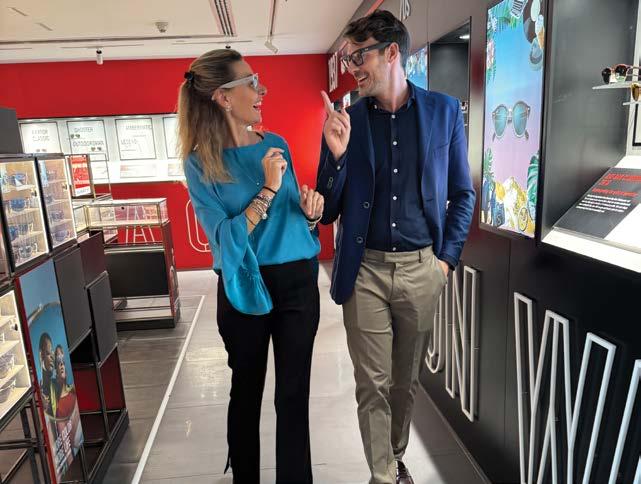
WE WANT EDUCATION TO BE PART OF OUR MISSION. WHETHER IN OUR SHOWROOMS, OUR PARTNERS’ STORES, OR OUR CAMPAIGNS.”
programs for eye care professionals— both internal teams and external partners. “It’s how we bring the science of vision to the frontlines”.
In the GCC, EssilorLuxottica has introduced in-store digital kiosks allowing customers to compare different lenses types in real time and learn about the benefits of features like premium coatings, light filtering, and eye fatigue reduction. These features are making a difference for how we see the world, ho we feel into it and so how we live. This is obvious, but not so obvious at the end. Right? How can you guys work on all those topics, together?
Well, I get to know that EssilorLuxottica owns 44 RsD facilities around the world, 13,000+ patents, a vertically integrated supply chain. “We control every step—from material to manufacturing to design to distribution,” says Andrea. That means faster innovation, tighter quality control, more capacity to respond to local needs working together on the mandate of making this world a better one, for all human beings. “We want to lead, yes—however we do that in a way that’s rooted in empathy, culture, and human relevance.”
We wrap up our walk by the digital vision test area. An elegant space where eye scans meet mobile diagnostics. “This is where we’re going,” Andrea says. “Vision care that’s proactive, intelligent, and part of how people live—not just something they fix when it breaks.” That means more innovation in smart eyewear, hearing solutions, AI-assisted vision diagnostics, and outreach through the OneSight Foundation, which provides access to vision care in underserved communities.

“Innovation should feel natural, not forced. It should empower, not distract.”
As I step outside, Dubai’s sun floods my eyes and I pause for a moment. So much brighter, somehow, than when we started this walk.
I think about everything I’ve just seen, and about how far this industry has come since I was a young consultant in Agordo, over 20 years ago, working on the design of an integrated operating model for eyewear manufacturing. Back then, we spoke about supply chains, efficiencies, and
industrial flows. Today, the conversation is about empowering humanity, protecting children’s vision, enhancing longevity, and reshaping how people live and connect through sight. It strikes me how many of these advancements - so meaningful, so impactful - still go largely untold. I walk away from this conversation with Andrea thinking not only about the innovation I’ve witnessed, but about how vital it is that companies like EssilorLuxottica start sharing these stories more often. Not as corporate milestones, but as proof that the future of vision isn’t just about technology or market share. It’s about purpose, prevention, and progress. And most of all, it’s about people.
These are stories that deserve to be heard. Louder, and more clearly.

Raffaella Campagnoli is the founder and Managing Director of LIRA Strategy Partners.
With over 20 years of experience in strategy consulting in international firms, she was formerly the Managing Director at Accenture Strategy Middle East and Turkey for nine years. Raffaella left Accenture after 13 years at the company, during which she led transformation programs in multiple regions (Europe, US, Turkey, Singapore, Middle East), specialized in strategic planning, operating model transformation, zero based budgeting, digital transformation and innovation, ecosystem strategy.
Raffaella has been leading impactful transformations in industries like travel and hospitality, fashion, consumer products goods, and retail, thereby developing a trusted network of partners and experienced professionals.
→ Ziad Melhem is the Group CEO of CFI Financial Group, a UAE-based online trading broker with over 25 years of experience in the region and beyond.

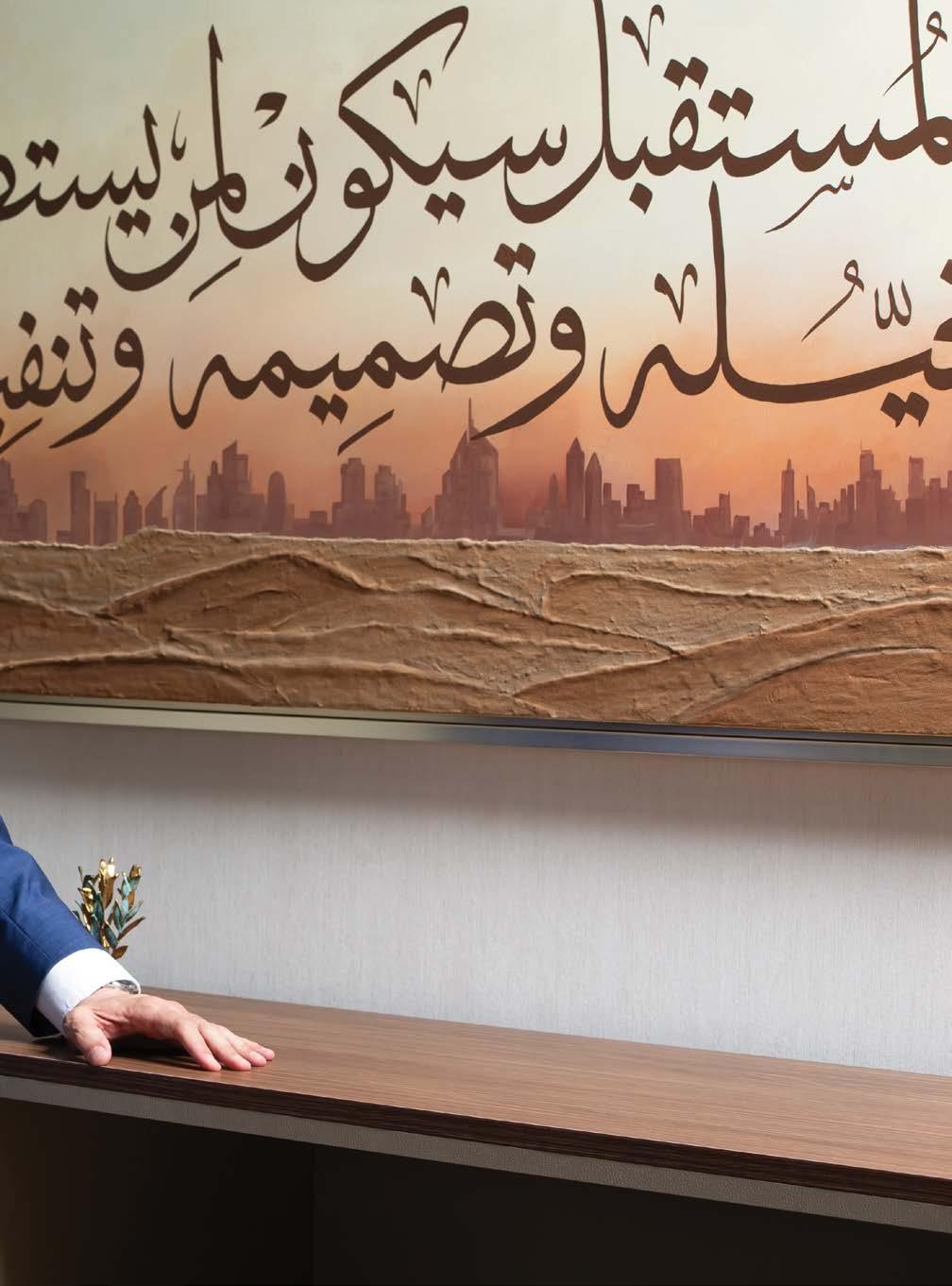
LEGACY
THROUGH
INTEGRITY
Having stepped into the role of Group CEO at UAE-based CFI Financial Group this year, Ziad Melhem already has his vision board mapped out to incorporate new global ambitions and platform enhancements. But in tethering all of these goals together, he hopes to preserve the cornerstone of the company’s success so far: customer trust.
by AALIA MEHREEN AHMED
Two months ago, UAEbased global online trading provider CFI Financial Group (CFI) recorded an all-time high quarterly trading volume of US$1.51 trillion in the second quarter of the year– an achievement which brought the first half of its 2025 total volume to $2.79 trillion, marking a 110% increase from the first half of 2024. Only a month prior to the announcement, Ziad Melhem had transitioned from his role as Chief Marketing Officer at CFI to Group CEO. “This result came from two forces working together,” Melhem says. “On one side, global market conditions created volatility and opportunities that attracted traders and investors to be more active. But on the other hand, CFI was ready to capture that momentum with the right infrastructure, competitive pricing, and a strong presence close to people in the markets where they live and trade. Our readiness was key. By combining advanced platforms, multi-asset access, and continuous support such as seminars, daily market coverage, research tools, and learning initiatives like CFI Academy [the brand’s educational arm], we enabled clients to take advantage of opportunities with speed and confidence. This balance of favorable markets and a trusted trading environment created the foundation for this record milestone.”
But Melhem insists that it wasn’t just the mammoth metrics involved that makes all of this awe-worthy. “This achievement is meaningful not only because of the number, but the fact that it reflects long-term loyalty,” he says. “Clients do not just open accounts with CFI; they stay, trade, and invest more actively with us. The trust we have built through strong infrastructure, competitive pricing, and local engagement is what turned market volatility into opportunity and lifted us to $1.51 trillion in volume in a single quarter.”
But this trading volume win has only been a natural consequence of the carefully curated tools and strategies applied by the CFI team over the years. Today, nearly three decades since its launch in 1998, CFI is present in 15 nations across the globe and has regulated offices across the Middle East, Africa, and Europe. Offering access to
both global and local markets, the platform has clinched such growth through diverse trading options across equities, currencies, and commodities, among others. “Our platforms are intuitive, commission-free with tight spreads, and backed by 24/7 support combined with smart trading features that make the experience both accessible and empowering,” Melhem elaborates. “What truly sets CFI apart is the way we embed learning, trading insights, and market analysis tools into the client experience. Through CFI Academy, clients can build skills at their own pace with structured, on-demand modules. Alongside this, we deliver multilingual webinars, active seminars, and daily market coverage that translates market movements into practical knowledge. On top of that, our partnerships with global providers such as Trading Central and TipRanks give clients
MY VISION AS GROUP CEO IS TO ELEVATE CFI FROM A LEADER IN ONLINE TRADING TO THE PREMIER GLOBAL HUB FOR TRADING AND INVESTMENT OPPORTUNITIES, WHERE BOTH NOVICE AND SEASONED TRADERS CAN DEVELOP CONFIDENCE AND UNLOCK THEIR FULL FINANCIAL POTENTIAL.”
EACH LICENSE IS MORE THAN JUST COMPLIANCE; IT REFLECTS OUR COMMITMENT TO TRANSPARENCY, CLIENT PROTECTION, AND INTERNATIONAL BEST PRACTICES, VALUES THAT HAVE BEEN THE FOUNDATION OF CFI’S GROWTH STORY.”
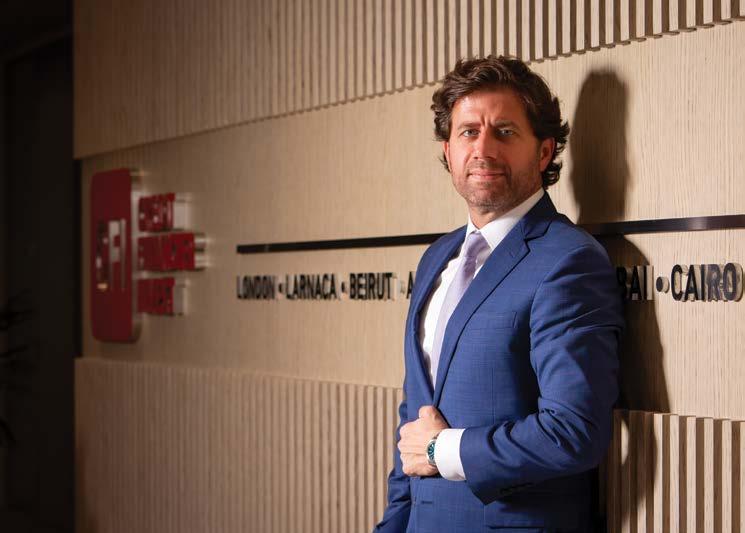
→ Operating from key locations like London, Abu Dhabi, Dubai, Cape Town, Baku, Beirut, Amman, and Cairo, CFI provides seamless access to both global and local markets.
access to world-class analysis tools that support better decision-making. Whether someone is entering their first trade or developing long-term investment strategies, CFI ensures they are equipped not only with access to markets but with the insights and tools to grow their confidence and performance.”
At the heart of this global footprint —which includes a presence across the UAE, UK, Jordan, Lebanon, Egypt, Cyprus, Oman, Azerbaijan, South Africa, and Mauritius— has also been a commitment to
finetune their services to the diverse regulatory landscapes of the markets they cater to. “We are licensed and supervised by more than 15 leading financial regulators, including the FCA in the UK, CySEC in Cyprus, the Securities and Commodities Authority (SCA) in the UAE, the Jordan Securities Commission, and the Egyptian FRA, alongside regulators in Africa, LATAM, and other global jurisdictions,” Melhem reveals.
In the time between the interview with Melhem and this feature being written, CFI
also received regulatory authorization from the Colombian Financial Superintendence (SFC) to move forward with the establishment of a representative office in Colombia. “This makes CFI not only one of the most regulated and widely established brokers in the region, but also a truly global player,” Melhem says. “Each license is more than just compliance; it reflects our commitment to transparency, client protection, and international best practices, values that have been the foundation of CFI’s growth story.”
→ Offering diverse trading options across equities, currencies, commodities, and more, CFI delivers customer-centric conditions, including zero-pip spreads, no commission fees, and ultra-fast execution.

But while the core CFI team has clearly done everything right by the conventional trading business book, it is that word –trust– that Melhem repeatedly mentions throughout his responses that has defined how each of these strategies have played out. “Over the years, we have built a reputation as a trusted leader,” he says. “As such, the next step is to scale this trust on a much bigger stage through bold global expansion, cutting-edge technology, and deeper client engagement. Our focus is twofold. First, continuing to break down barriers by making trading more straightforward, more innovative, and more transparent. Second, strengthening and broadening our offerings through carefully chosen innovations, including enhanced multi-asset access and innovative trading features that give clients an edge. My vision as Group CEO is to elevate CFI from a leader in online trading to the premier global hub for trading and investment opportunities, where both novice and seasoned traders can develop confidence and unlock their full financial potential.”
Melhem’s vision for CFI’s next chapter of growth is, in fact, deeply embedded in CFI’s core mission: to make global markets accessible, intuitive, and empowering. To achieve this, the platform already has a clearly demarcated system of platforms that cater to different types of users. “At CFI, we provide a variety of platforms so that every client, whether focused on trading or investing, can choose what best fits their style,” Melhem explains. “The CFI Trading App is at the center of this, built for simplicity, mobility, and real-time updates. It has quickly become our most popular choice, especially for younger and mobile-first traders who want everything in one place. For those
who prefer quick access without downloads, Webtrader is an easy option. More advanced traders often choose cTrader, which offers detailed analytics and very fast execution. MT4 and MT5 remain global standards trusted by
WHAT TRULY SETS CFI APART IS THE WAY WE EMBED LEARNING, TRADING INSIGHTS, AND MARKET ANALYSIS TOOLS INTO THE CLIENT EXPERIENCE. THROUGH CFI ACADEMY, CLIENTS CAN BUILD SKILLS AT THEIR OWN PACE WITH STRUCTURED, ON-DEMAND MODULES.”
millions of traders. MT4 is well known for its reliability, while MT5 expands into broader multi-asset opportunities for clients who want to combine trading and investing. We also offer TradingView, a platform that combines powerful charting tools with social trading and commu-
nity features, allowing clients to share and test strategies. Finally, CFI MultiAsset brings all of this together in one hub, giving clients a single place to access multiple markets and manage both trading and investing.”
CFI’s attention to detail, however, doesn’t end with these myriad of tools– underscoring all of these services has been a long-standing commitment to empower clients with the knowledge and clarity required to trade and invest with confidence. “Education has always been part of who we are, and the CFI Academy is a comprehensive culmination of this important brand sentiment,” Melhem explains. “The Academy brings everything together in one structured and accessible hub. Clients can build practical skills step by step and apply them directly in the markets. The Academy is designed for every level of experience. New traders can start with the essentials, while advanced investors can refine strategies and explore more complex topics. What makes it powerful is the range of features available, including interactive video courses, market simulations, quizzes, and progress tracking, all delivered in multiple languages and available on demand. It is also part of a wider ecosystem of knowledge and support. Alongside it, we provide webinars, in-person seminars, daily market coverage, and professional analysis tools that keep clients connected to real-time opportunities. For us, CFI Academy is not about traditional financial literacy. It is about giving every client the ability to strengthen their capabilities, make informed decisions, and engage with trading and investing in a responsible and sustainable way.”
In an encouraging turn of events, in July 2025, Russian tennis
superstar Maria Sharapova joined CFI as a global brand ambassador, citing the company’s “focus on innovation, education, and empowering individuals” as a key reason for her involvement. “Whether in sport or business, success comes down to being intentional, prepared, and willing to learn,” Sharapova said in a statement. “I’ve always believed in the importance of staying curious, adapting to change, and leading with purpose, and those values have continued to guide me beyond the court. I’m proud to be CFI’s Global Brand Ambassador and support the Group’s global mission to inform, inspire, and connect with individuals who are pursuing their own paths to growth.”
The five-time Grand Slam champion, Olympic medalist, and entrepreneur’s endorsement was the second such instance of a globally renowned name joining CFI– the first was seven-time Formula 1™ world champion Lewis Hamilton, who became CFI’s global brand ambassador in July 2024 and continues to remain so. “Hamilton drives our global presence as the number one face of CFI, while Sharapova strengthens our message of inclusivity and inspiration,” Melhem says. “Importantly, these partnerships also translate into unique experiences for our clients, from exclusive events to interactive sessions that go beyond trading and investing, making CFI a brand that is about
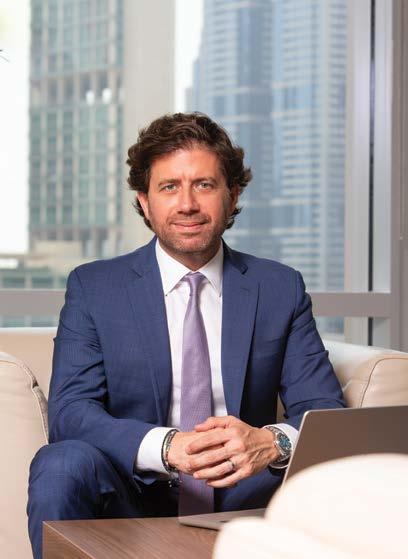
OUR FOCUS IS TWOFOLD. FIRST, CONTINUING TO BREAK DOWN BARRIERS BY MAKING TRADING MORE STRAIGHTFORWARD, MORE INNOVATIVE, AND MORE TRANSPARENT. SECOND, STRENGTHENING AND BROADENING OUR OFFERINGS THROUGH CAREFULLY CHOSEN INNOVATIONS, INCLUDING ENHANCED MULTI-ASSET ACCESS AND INNOVATIVE TRADING FEATURES THAT GIVE CLIENTS AN EDGE.” “
empowerment and aspiration on every level.”
Now, while educational empowerment has clearly
ences. “My time as CMO taught me one of the most valuable lessons, which is the power of truly listening to clients,” he says. “By staying close to traders, we learned about their pain points, their ambitions, and how they experience our platforms. That client-first mentality shaped everything we created, from educational resources to mobile apps. As CEO, I want to carry that same philosophy forward. Marketing was about building trust and communicating value. Now my role is about making sure that trust defines how the entire company operates. Whether through localized strategies, smarter technology, or stronger community engagement, my priority is to ensure the voice of our clients not only guides how we communicate but drives how we innovate, expand, and deliver globally.”
been a part of the company’s culture for a long time, it is also something that stems from Melhem’s own leadership experi-
To champion this delicate mix of brand innovation and customer loyalty, Melhem notes that it is equally important for CFI’s entrepreneurial company culture to stay alive. “Agility, innovation, and a client-first mindset are part of our DNA, and those qualities will continue to define how we operate,” he says. “They are what allowed us to grow from a regional player into a global brand, and they remain essential as we take the next steps in our journey. But at the same time, I see culture as something that must continue to evolve. As a
CLIENTS DO NOT JUST OPEN ACCOUNTS WITH CFI; THEY STAY, TRADE, AND INVEST MORE ACTIVELY WITH US. THE TRUST WE HAVE BUILT THROUGH STRONG INFRASTRUCTURE, COMPETITIVE PRICING, AND LOCAL ENGAGEMENT IS WHAT TURNED MARKET VOLATILITY INTO OPPORTUNITY AND LIFTED US TO $1.51 TRILLION IN VOLUME IN A SINGLE QUARTER.”
global company with teams across different regions, we need to strengthen collaboration and knowledge sharing across markets. This has always been supported by our managing founders, who encouraged openness and teamwork as we scaled. Building on that foundation, I want to create even more opportunities for people to grow inside the company, to develop their skills, and to feel connected to the bigger vision of what we are building together. The culture I want to foster is one where innovation is collective rather than siloed, where every employee feels that their contribution matters, and where ambition is matched with responsibility. In short, we will keep the entrepreneurial drive that built CFI, while expanding on the founders’ vision with new structures that ensure our people grow with us as we continue to expand worldwide.”
Helping these global ambitions stay grounded has been CFI’s endeavors to stay connected, and give back, to the nation that houses its main base. “For CFI, the biggest milestone has been establishing the UAE as both a dear market to our heart and the home of our global headquarters,” Melhem declares. “We are licensed and regulated by the SCA, and today we operate three branches across Dubai, Abu Dhabi, and Sharjah. This local footprint allows us to stay close to our clients, support them directly in their communities, and demonstrate our long-term commitment to the country. Our role also extends beyond financial services. Through our partnerships with the Department of Culture and Tourism - Abu Dhabi and Etihad Arena, we contribute to the community by supporting major sports and cultural events that bring people together and position the UAE high on the global stage. These partnerships reflect our belief that a strong brand should not only provide access to trading and investing but also add value to the societies in which it operates. This combination of being headquartered in the UAE, operating under trusted regulation, building a physical presence across the three main cities, and contributing to the broader community positions CFI as a brand that clients can rely on. The UAE is both our anchor and our launchpad as we continue to expand globally.”
It is with this mindset that Melhem now hopes to implement his plans for CFI’s future. “On the business side, we will continue expanding into new markets, with South Africa and Azerbaijan already setting the tone for a broader global footprint. More territories are on the
horizon, and we are preparing carefully to enter them responsibly and with impact. On the product and technology side, we are rolling out important upgrades to our platforms. Clients can expect more features in the CFI Trading App, stronger multi-asset access, and smarter trading tools that make the experience easier, faster, and more empowering for both trading and investing.”
“The long-term vision remains constant: to redefine how people everywhere access and engage with financial markets,” Melhem adds. “The next year is about turning that vision into measurable steps and making sure we raise the bar in everything we deliver!”

→ CFI fosters financial literacy through multilingual educational content and inspires excellence through partnerships with global icons like AC Milan, FIBA WASL, and MI Cape Town cricket team, as well as the Department of Culture and Tourism –Abu Dhabi.



Forum& Awards 2025
THE RECAP
The winners of the Sustainability Innovation Awards 2025, hosted by BNC Publishing, were announced on August 29, 2025, at Al Habtoor Palace, Dubai.
The gala night celebrated companies that have demonstrated exceptional commitment to sustainability in a variety of industries including construction, real estate, architecture, design, logistics, transport, energy, hospitality, and others.
Sustainability Innovation Awards 2025 was organized in association with Gold sponsors Numai Real Estate, ServeU, & Hansgrohe; Silver sponsor AECOM;
and Category sponsor TTE Facilities Management. The event brought together industry leaders, innovators, and changemakers who are committed to shaping a sustainable corporate future in the Middle East—one where innovation meets accountability.
Earlier the same day, the Sustainability Innovation Forum 2025 was held at the same venue. The forum, designed to ignite inspiration and drive among construction pioneers, entrepreneurs, hospitality visionaries, and design leaders, saw thought-provoking discussions and forward-thinking ideas across four panel discussions.

BNC PUBLISHING CEO
Wissam Younane
SUSTAINABLE GUEST ROOM SUPPLIER OF THE YEAR / GUEST SUPPLY
NET-ZERO BUILDING OF THE YEAR / MUBADALA INVESTMENT COMPANY AND MASDAR CITY
SUSTAINABLE FUTURE PROJECT OF THE YEAR / PNC ARCHITECTS
SUSTAINABLE RESIDENTIAL PROJECT OF THE YEAR / ATKINSRÉALIS
WELLNESS PROJECT OF THE YEAR / MAG
SUSTAINABLE FIT-OUT FIRM OF THE YEAR / SUMMERTOWN INTERIORS
SUSTAINABLE ARCHITECTURE FIRM OF THE YEAR / SKIDMORE, OWINGS & MERRILL (SOM)
SUSTAINABLE CONTRACTOR OF THE YEAR / INNOVO
SUSTAINABLE HOSPITALITY INITIATIVE OF THE YEAR / RADISSON HOTEL GROUP
GREEN DIGITAL INFRASTRUCTURE OF THE YEAR / MORO HUB
WASTE MANAGEMENT INITIATIVE OF THE YEAR / DRYDOCKS WORLD
MOST INNOVATIVE SOLUTION / NEOM
SUSTAINABLE HOTEL OF THE YEAR/ MÖVENPICK RESORT AL MARJAN ISLAND
ZERO PLASTIC INITIATIVE OF THE YEAR / HANSGROHE
ENERGY SERVICES COMPANY OF THE YEAR / ETIHAD WATER AND ELECTRICITY (ETIHADWE)
SUSTAINABLE INITIATIVE OF THE YEAR / DESIGN INFINITY
ENERGY COMPANY OF THE YEAR / NMDC GROUP
GREEN CONSULTANT FIRM OF THE YEAR /AECOM
SUSTAINABLE PROGRAMME OF THE YEAR / ATKINSRÉALIS
CORPORATE EXCELLENCE AWARD / TTE FACILITIES MANAGEMENT
ECO-FRIENDLY HOTEL AMENITIES PROVIDER OF THE YEAR / GUEST SUPPLY
OVERALL FM COMPANY OF THE YEAR / SERVEU
SUSTAINABLE DEVELOPMENT OF THE YEAR / SAMANA DEVELOPERS
WOMAN PROFESSIONAL OF THE YEAR / VASH SINGH (KEO INTERNATIONAL CONSULTANTS)
ENVIRONMENTAL IMPACT STRATEGIST OF THE YEAR / SAMIR MULLA (ALEC ENERGY)
ENTREPRENEUR OF THE YEAR / NAYLA HADDAD (ONE OF A KIN)
CHIEF SUSTAINABILITY OFFICER OF THE YEAR / P.R. JAGANNATHAN
CEO OF THE YEAR / YOUSUF FAKHRUDDIN
VISIONARY LEADER OF THE YEAR / KABIR MULCHANDANI
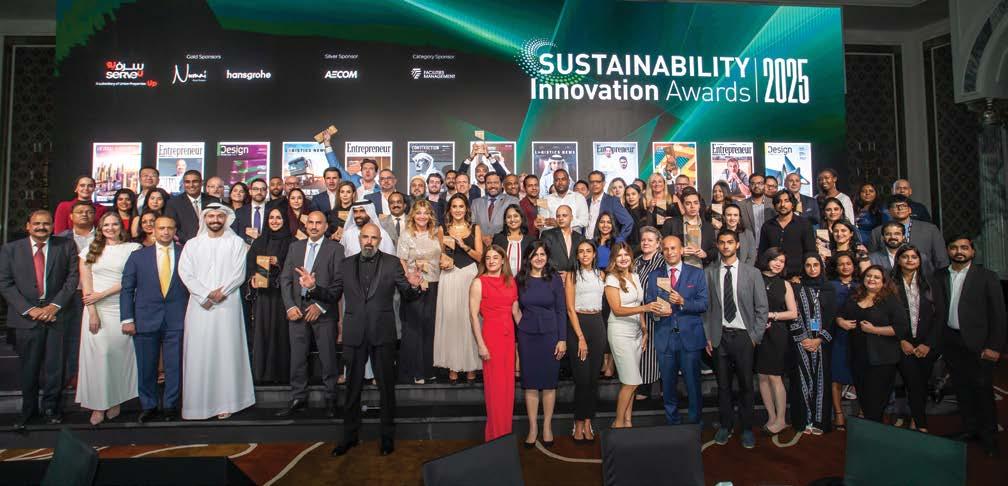

ENERGY SERVICES COMPANY OF THE YEAR
Etihad Water and Electricity (ETIHADWE)





SUSTAINABLE HOSPITALITY INITIATIVE OF THE YEAR INITIATIVE: NET ZERO AND GREEN BUILDING INNOVATION
Radisson Hotel Group
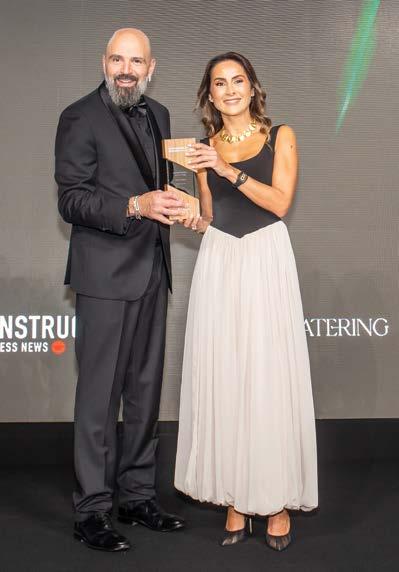
ENTREPRENEUR OF THE YEAR
NAYLA HADDAD
One of a Kin

ECO-FRIENDLY HOTEL AMENITIES
PROVIDER OF THE YEAR
Guest Supply
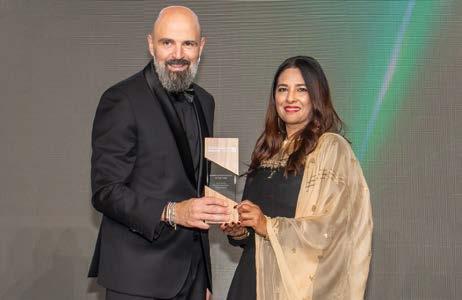
WOMAN PROFESSIONAL OF THE YEAR
VASH SINGH KEO International Consultants
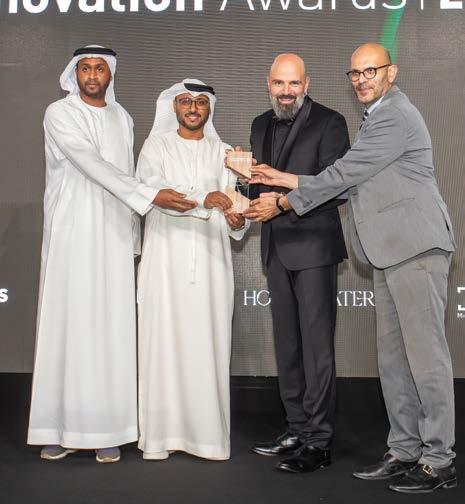
ENERGY COMPANY OF THE YEAR NMDC Group

SUSTAINABLE PROGRAMME OF THE YEAR INITIATIVE: SCHOOL OF THE FUTURE INITIATIVE AtkinsRéalis GREEN CONSULTANT FIRM OF THE YEAR




SUSTAINABLE GUEST ROOM SUPPLIER OF THE YEAR


ENVIRONMENTAL IMPACT STRATEGIST OF THE YEAR
WINNER: SAMIR MULLA
ALEC Energy

SUSTAINABLE RESIDENTIAL PROJECT OF THE YEAR THE SUSTAINABLE CITY – YAS ISLAND PROJECT AtkinsRéalis



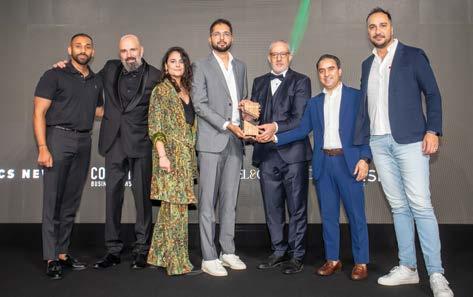
ZERO PLASTIC INITIATIVE OF THE YEAR INITIATIVE: BEYOND PLASTIC PACKAGING INITIATIVE Hansgrohe

MOST INNOVATIVE SOLUTION
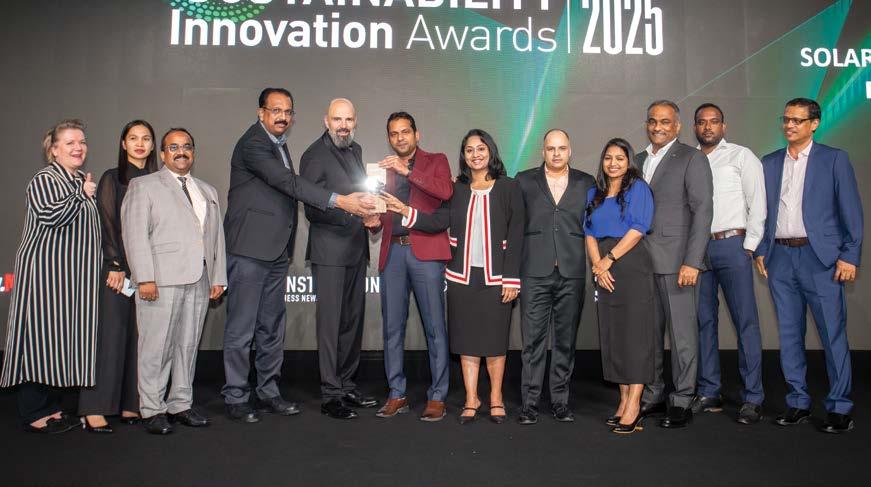
SUSTAINABLE INITIATIVE OF THE YEAR INITIATIVE: SOLAR POWERED FACTORY Design Infinity
FASTEST GROWING APP OF THE YEAR - Vurse
Neom

CEO OF THE YEAR
WINNER: YOUSUF FAKHRUDDIN Fakhruddin Properties

SUSTAINABLE CONTRACTOR OF THE YEAR Innovo


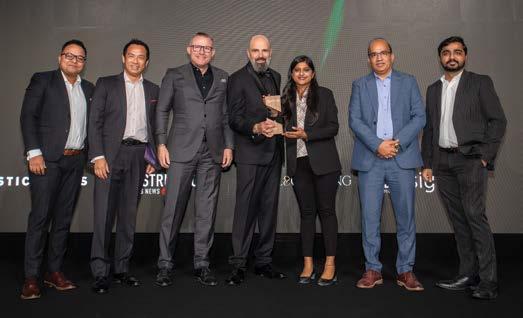
VISIONARY LEADER OF THE YEAR WINNER: KABIR MULCHANDANI FIVE Holdings


SUSTAINABLE ARCHITECTURE FIRM OF THE YEAR Skidmore, Owings & Merrill (SOM)

WASTE MANAGEMENT INITIATIVE OF THE YEAR
INITIATIVE: WASTE RECYCLING INITIATIVE Drydocks World
WELLNESS PROJECT OF THE YEAR
PROJECT: KETURAH RESORT BY MAG MAG
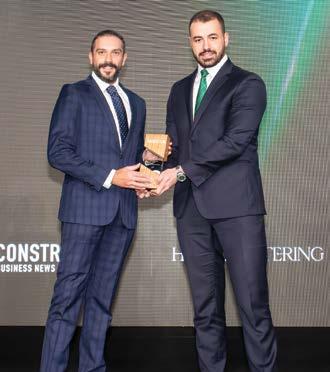
CONSULTANT OF THE YEAR - Waleed Al Amiri

SUSTAINABLE DEVELOPMENT OF THE YEAR
PROJECT: SAMANA OCEAN VIEWS Samana Developers


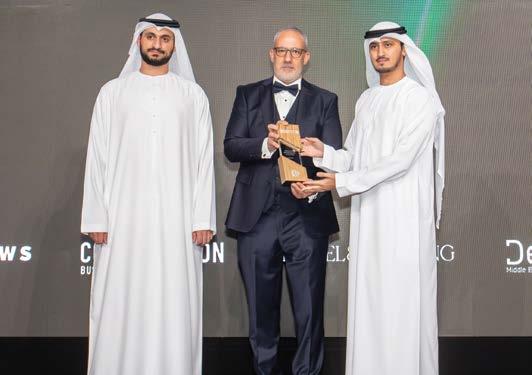
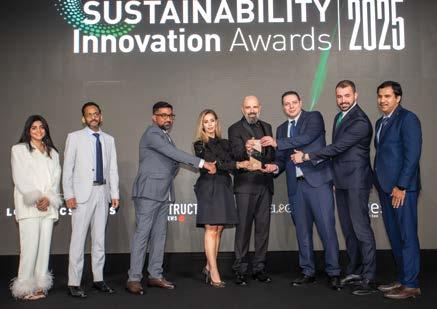
OVERALL FM COMPANY OF THE YEAR ServeU

SUSTAINABLE FIT-OUT FIRM OF THE YEAR Summertown Interiors GREEN DIGITAL INFRASTRUCTURE OF THE YEAR Moro Hub
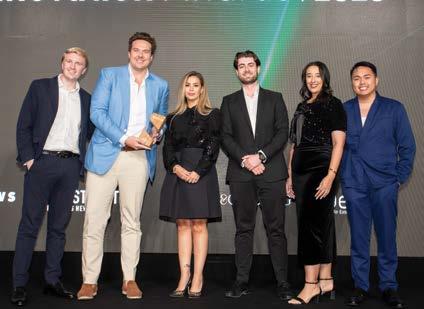
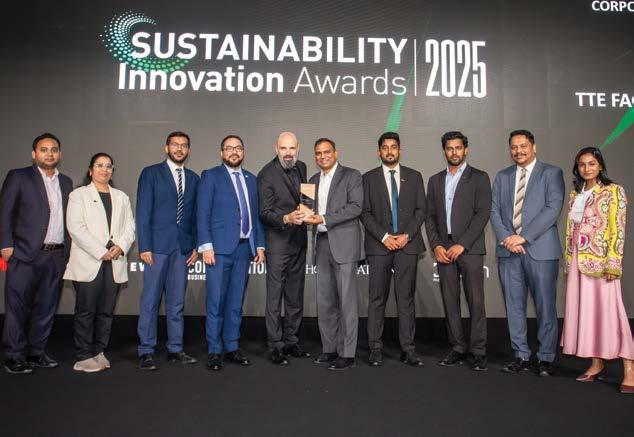
CORPORATE EXCELLENCE AWARD TTE Facilities Management
SUSTAINABLE HOTEL OF THE YEAR Mövenpick Resort Al Marjan Island



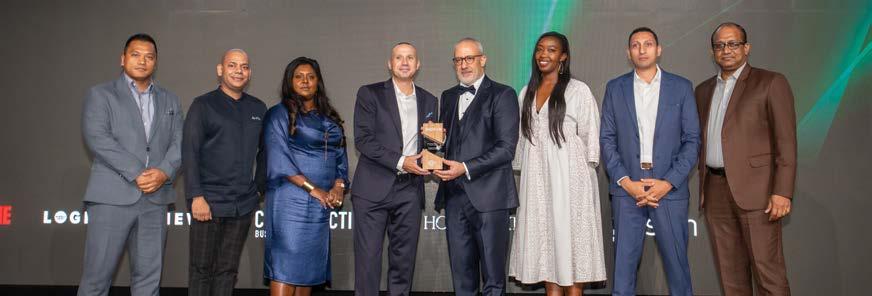
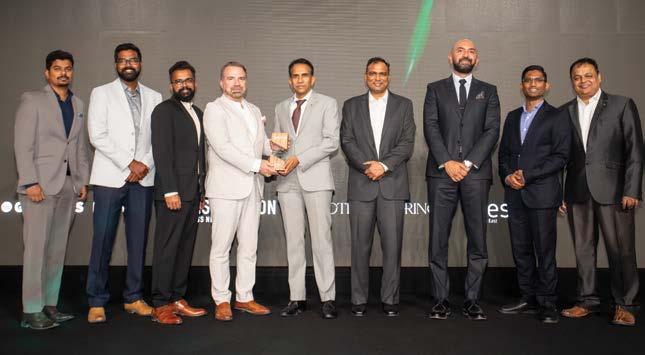
SUSTAINABLE FUTURE PROJECT OF THE YEAR
PROJECT: SOBHA WAVES OPULENCE PNC Architects
CHIEF SUSTAINABILITY OFFICER OF THE YEAR WINNER: P.R. JAGANNATHAN Sobha Realty

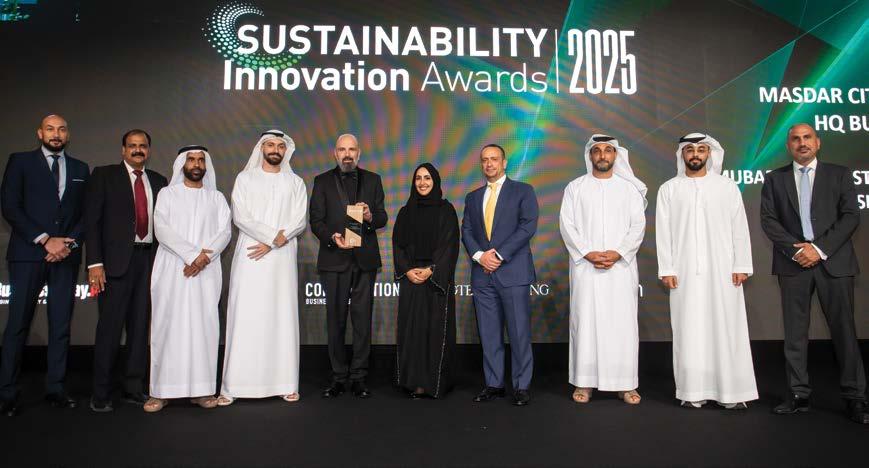

BY THE SEA MIORI
A coastal world shaped by salt, light, and effortless belonging
by SEYMONE L. MOODEY
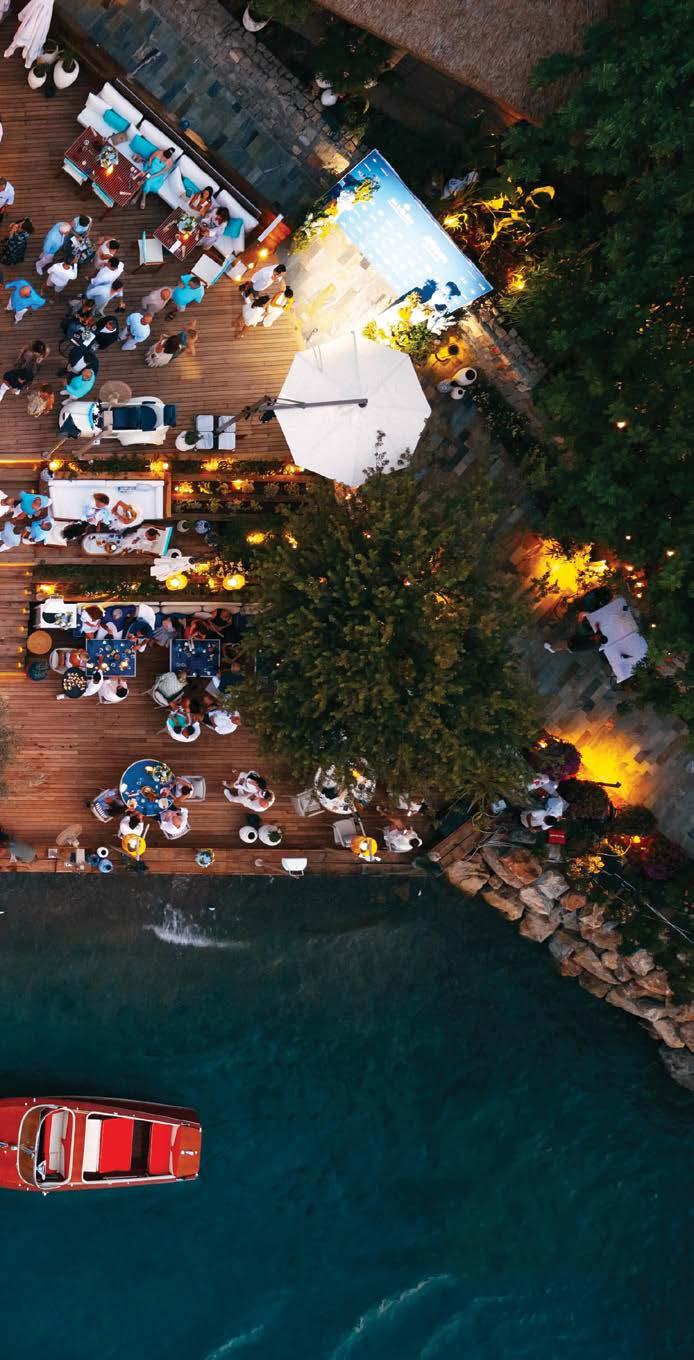
There are places that ask for your attention, and then there are places like MIORI by the Sea, where nature does all the talking.
This new coastal destination redefines what it means to escape. From the moment you arrive by boat, which is the only way to reach it, everything changes. The water is crystal clear. The colours shift from pale turquoise to deep sapphire. The pace slows. And the world fades behind you.
Set within the quiet elegance of Bedri Rahmi Bay, MIORI by the Sea is a new opening, a benchmark. A place that honours its surroundings without overpowering them. A new chapter for coastal hospitality in Türkiye.
The view alone is enough to stop you mid-sentence.
Pine-covered hills rise behind you. The bay stretches wide ahead. And in between, a destination that feels perfectly placed.
MIORI doesn’t interrupt the landscape. It blends into it. Light wood, natural stone, crisp white linens. Nothing imposed. Nothing unnecessary. Just design that lets the sea do the talking.
There’s no grand entrance. No gates. Just a soft landing. A welcome that comes not through words but feeling.
The journey doesn’t start at MIORI. It starts at XO Cape Arnna.
Set on the Aegean coast in Sarigerme, this flagship resort sprawls across over 100,000 square metres of smart Mediterranean design. It's


clean, contemporary, and intentional, a space that never overwhelms, yet constantly impresses. Thoughtful texture, refined tones and spaces that allow you to exhale.
Guests staying in The Club, XO Cape Arnna’s adults-only section, will find a careful balance of polished service and laid-back ease. The team are attentive, sincere, and engaging, striking the right tone between professionalism and warmth.
The overall atmosphere at XO Cape Arnna feels finely tuned. Everything flows smoothly and intuitively, from the design of the rooms to the rhythm of the poolside experience.
The transfer from XO Cape Arnna to MIORI wasn’t just scenic, it was symbolic. There’s no road access to MIORI. You arrive by sea, as if slipping into a secret only those with access know about.
And then it appears. Folded quietly into the protected cove of Bedri Rahmi Bay. There’s no neon signage. No manicured photo wall. What you get instead is soft, natural wood, the sound of water against the deck, and a layout that lets the coastline speak for itself.
The design of MIORI blends into its
surroundings. It’s intentional without being overly architectural. Its design is rooted in the elements: warm wood, sun-washed stone, soft linen, and an architectural rhythm that mirrors the flow of the sea. The layout breathes. Every corner is shaped by light, view and purpose. From the sea deck to the walkways, every detail is intentional and yet, nothing feels staged. The mood is calm but confident. This is not about extravagance. This is about elegance without excess. Everything that needs to be there, is. Nothing more. Nothing less. Bedri Rahmi Bay has always been a special place, a painter’s dream, a sailor’s escape, a hidden cove where time stretches. And now, with the arrival of MIORI, it has something it never had before: a destination that amplifies its beauty while protecting its soul.
Here, days unfold in layers, gentle and generous. Guests move not by schedule, but by instinct. There are no hard lines. Just moments that ease into each other. A soft breakfast leads to a long swim. A shaded lunch becomes an afternoon on the deck. A cocktail turns into dinner. Then music. Then stars.
“

A
soft breakfast leads to a long swim. A shaded lunch becomes an afternoon on the deck. A cocktail turns into dinner. Then music. Then stars.”
YIGIT SEZGIN, Founder and Managing Partner, Clé & Partners


“MIORI DOESN’T INTERRUPT THE LANDSCAPE. IT BLENDS INTO IT. LIGHT WOOD, NATURAL STONE, CRISP WHITE LINENS. NOTHING IMPOSED. NOTHING UNNECESSARY. JUST DESIGN THAT LETS THE SEA DO THE TALKING.”
The property is home to six distinctive culinary concepts, each designed to honour a different part of the coastal experience. But they are not separate worlds, they are chapters of the same story.
The property is home to six distinctive culinary concepts, each designed to honour a different part of the coastal experience. But they are not separate worlds; they are chapters of the same story. From The KITCHEN’s seamless shift from daytime ease to hidden speakeasy, to the coastal Italian energy of Isabel’s, the precise omakase storytelling at OKO, the artisanal calm of the BAKERY, and the new launch of Riva Lounge, MIORI’s culinary world is cohesive, soulful, and confident.
THE KITCHEN is where it all begins. In the morning, it’s calm and bright Turkish breakfasts are served with warm bread, fresh herbs, honeycombs and sun-soft tomatoes. As the day progresses, the space evolves. By night, a hidden speakeasy behind its walls reveals itself to be intimate, moody, and magnetic.
THE BAKERY is where morning rituals take root. Croissants warm from the oven. Perfect espresso. Light conversation.
ISABEL’S brings the Mediterranean to Göcek in a way that feels completely in place. The Italian spirit is alive in the details: hand-rolled pastas, olive oil that glows golden in the light, seafood that tastes like it was caught just hours before.
OKO, the Japanese omakase concept, is a quiet standout.
A three-act dining experience that speaks through simplicity. There’s reverence in every plate, balance, technique and story.
RIVA LOUNGE, now open for the first time in Türkiye, brings elevated energy to the MIORI experience. Its shoreline setting, international cocktail program, and sunset soundtrack make it an anchor for evenings that ease into night.
The July 4th launch was elegant and smooth. The entertainment, Solange, SinCasa, and Yakuza was carefully curated to support the atmosphere, drinks were flowing (Don Julio 1942, 71 Gin, XO Cape Arnna wines). The guest list included Francesco Missoni, Ralph Lauren Middle East Managing Director Yassine Sibari, globally renowned entrepreneur Nicolas Brochet, Meta Facebook executive Ahmad Shehada and many others of similar stature. A legacy crowd. Global reach.


Regional respect. People who see hospitality as more than a transaction. Everyone looked relaxed, comfortable and present.
To understand why MIORI feels so considered, you need to look at the person behind it. Yigit Sezgin, Founder & Managing Partner of Clé & Partners, isn’t new to hospitality, he’s helped shape it. With over three decades of global experience across the luxury and lifestyle space, Sezgin’s resume includes senior leadership roles at Raffles, Fairmont, SLS, Banyan Tree, Regent, Missoni, and Ritz-Carlton, as well as Bilgili Holding. Previously Global Chief of Brand & Commercial at Fairmont and later CCO of Accor Group, he led global portfolios across 40+ countries, establishing brand platforms, lifestyle frameworks, and strategic growth models. He also served as CEO of Bilgili Holding,
managing partnerships with Aman, Peninsula, W Hotels, Soho House and others.
When I think back on that weekend from XO Cape Arnna’s slow mornings to MIORI’s candlelit evenings, what I remember most is the rhythm. Nothing felt rushed. Nothing screamed for attention. And yet, everything hit exactly the right note.
This is a rare thing in hospitality: a brand that knows who it’s for, speaks to them clearly, and delivers without overpromising. It isn’t about theatrics. It’s about trust.
MIORI invites you into something that’s already been built with care. It gives you room to breathe, space to connect and a reason to return.
Good food, good mood and a destination that makes you want to keep coming back.



‘T/ Sustainability
LIXIL’s Stefan Schmied on Building a Greener IMEA Region
Stefan Schmied, Leader of LIXIL International’s IMEA region (India, the Middle East including Türkiye, and Africa), on uniting bold sustainability ambitions with long-term business growth.
by TAMARA PUPIC
In a region where growth is often measured in scale and speed, Stefan Schmied is steering a different course. As the Leader of IMEA (India, Middle East including Türkiye, and Africa) region at LIXIL International — part of Japan-headquartered LIXIL Corporation, a global powerhouse in housing, building materials, and sanitary equipment — he believes the true measure of progress lies in sustainability.
“Sustainability is not an add-on; it is at the core of our growth strategy,” Schmied says.
For Schmied, this statement is not just a corporate ethos, but a commitment to reshape how business and communities thrive across the region. “At LIXIL International, our long-term vision for the IMEA region is to drive responsible growth by embedding water and energy efficiency, durability, and transparency into every product and process,” he says.
Schmied explains that LIXIL’s commitment to sustainability also extends to GROHE, a German brand of high-quality bathroom and kitchen fittings that operates under the LIXIL umbrella. “For the GROHE brand, our four pillars, Quality, Technology, Design, and Sustainability, anchor this commitment,” he says. “Today, we already operate carbon-neutral* production across all fittings plants and have eliminated around 37 million plastic packaging items each year. By combining

→ Stefan Schmied is the Leader of IMEA (India, Middle East including Türkiye, and Africa) region at LIXIL International.
FOR US AT LIXIL AND THE GROHE BRAND, THE PRIORITY IS CLEAR: MAKING HIGH-EFFICIENCY AND PREMIUM PRODUCTS WIDELY ACCESSIBLE TO EVERYONE EVERYWHERE, ENGAGING CLOSELY WITH THE HOSPITALITY AND REAL ESTATE SECTORS, AND ENSURING DURABILITY AND PERFORMANCE REMAIN UN-COMPROMISED.”
“ Sustainability is not an add-on; it is at the core of our growth strategy.”
innovation with responsibility, we ensure we deliver lasting value for our customers while contributing positively to the planet.”
In particular, GROHE is taking concrete steps to promote water efficiency and conservation across its products and operations.
Schmied explains that GROHE’s product technologies, such as GROHE EcoJoy, can save a typical household more than 20,000 litres of water per year. “Another example is our Everstream water-recycling shower that reduces freshwater consumption by up to 65% and energy by about 70%. Our strategy works across three dimensions: products, operations, and enablement. Operationally, we run carbon-neutral fittings production and use plastic-reduced packaging. And through Environmental Product Declarations, we help developers in markets from the Middle East to India and Africa achieve green building certifications with transparent data.”
With the IMEA region confronting challenges as varied as water scarcity in the Middle East and infrastructure gaps across parts of Africa, Schmied notes that LIXIL’s solutions must be just as diverse— tailored to the unique needs of each market. “In the GCC, where water
TREP TALK
LIXIL’s Stefan Schmied on Making Sustainability a Driver of Growth
}"First, embed sustainability at the heart of your business value, it cannot be an afterthought.
}Second, support every commitment with verifiable data, such as Environmental Product Declarations, to give customers and partners confidence.
scarcity is the biggest challenge, we focus on high-efficiency showers and mixers, backed by verified data to meet local codes,” he says. “In parts of Africa, the priority is resilience and accessibility, so we emphasize robust, easy-to-install solutions and training through our GIVE Program (GROHE Installer Vocational Training and Education) to close the skills gap. In India, where renovation momentum accelerates, we see strong demand for durable mixers and retrofit-friendly systems that improve performance while conserving resources.”
Schmied is a firm believer that systemic change in sustainability can only happen through collaboration. For that reason, LIXIL works closely with governments and master developers across the IMEA region to integrate water-saving solutions into building codes and certification schemes. One example are the company’s environmental product declarations that enable
}Third, design solutions that can be retrofitted into existing infrastructure, helping accelerate adoption at scale.
}Fourth, build localized ecosystems with regional partners, from manufacturing to training, to strengthen resilience and speed up learning.
And finally, invest in people. By closing the skills gap through training, we ensure that innovations are applied effectively and deliver real impact where it matters most."
projects to meet leading standards, such as LEED (Leadership in Energy and Environmental Design) and BREEAM (Building Research Establishment Environmental Assessment Method).
Equally vital, Schmied believes, is the investment in people. GROHE’s GIVE Program (Installer Vocational Training and Education) is designed to train the next generation of installers across the region.
“It is to ensure they are equipped with the skills to build a more sustainable future,” Schmied explains. “With our first manufacturing facility in Saudi Arabia, we are also strengthening local supply chains, creating opportunities for more resilient growth, and supporting national sustainability goals.”
How shifting customer preferences shape corporate strategy, for Schmied, is a question that goes beyond market trends—it speaks to
‘T/ Sustainability

→
responsibility. As consumers increasingly demand sustainable and efficient products, he ensures that the GROHE brand is not just responding to change, but also guiding it. “Customers today expect verified quality and measurable impact,” Schmied says. “They look for durable finishes, efficient water and energy use, and solutions that can be easily integrated into existing spaces.” For that reason, GROHE provides Environmental Product Declarations to support certifications, such as LEED or BREEAM, in addition to its production facilities already operating carbon-neutral for fittings. He adds, “With technologies like GROHE
“
Ambitious environmental goals and business growth are not in conflict. They reinforce one another when we deliver long-term value for customers, communities, and the planet.”
EcoJoy, our products reduce water consumption while maintaining performance, ensuring that sustainability comes without compromise. Our responsibility as a brand is to make the sustainable choice the most attractive one, through timeless design, reliable engineering, and solutions that deliver lasting value for
customers and the planet.”
Looking ahead, he is excited about the opportunity to scale water-saving innovations across some of the world’s fastest-growing markets. “For us at LIXIL and the GROHE brand, the priority is clear: making high-efficiency and premium products widely accessible to everyone
everywhere, engaging closely with the hospitality and real estate sectors, and ensuring durability and performance remain un-compromised,” Schmied says. “On a Group level, LIXIL Corporation sales account for US$3.5 billion. Within this framework, the IMEA region holds the position of the third-largest international market, reaching above US$400 million this year.” Schmied says concludes by saying that these numbers show that ambitious environmental goals and business growth are not in conflict. “They reinforce one another when we deliver long-term value for customers, communities, and the planet,” Schmied points out.
Schmied explains that LIXIL’s commitment to sustainability also extends to GROHE, a German brand of high-quality bathroom and kitchen fittings that operates under the LIXIL umbrella.
The voice of entrepreneurship around the world
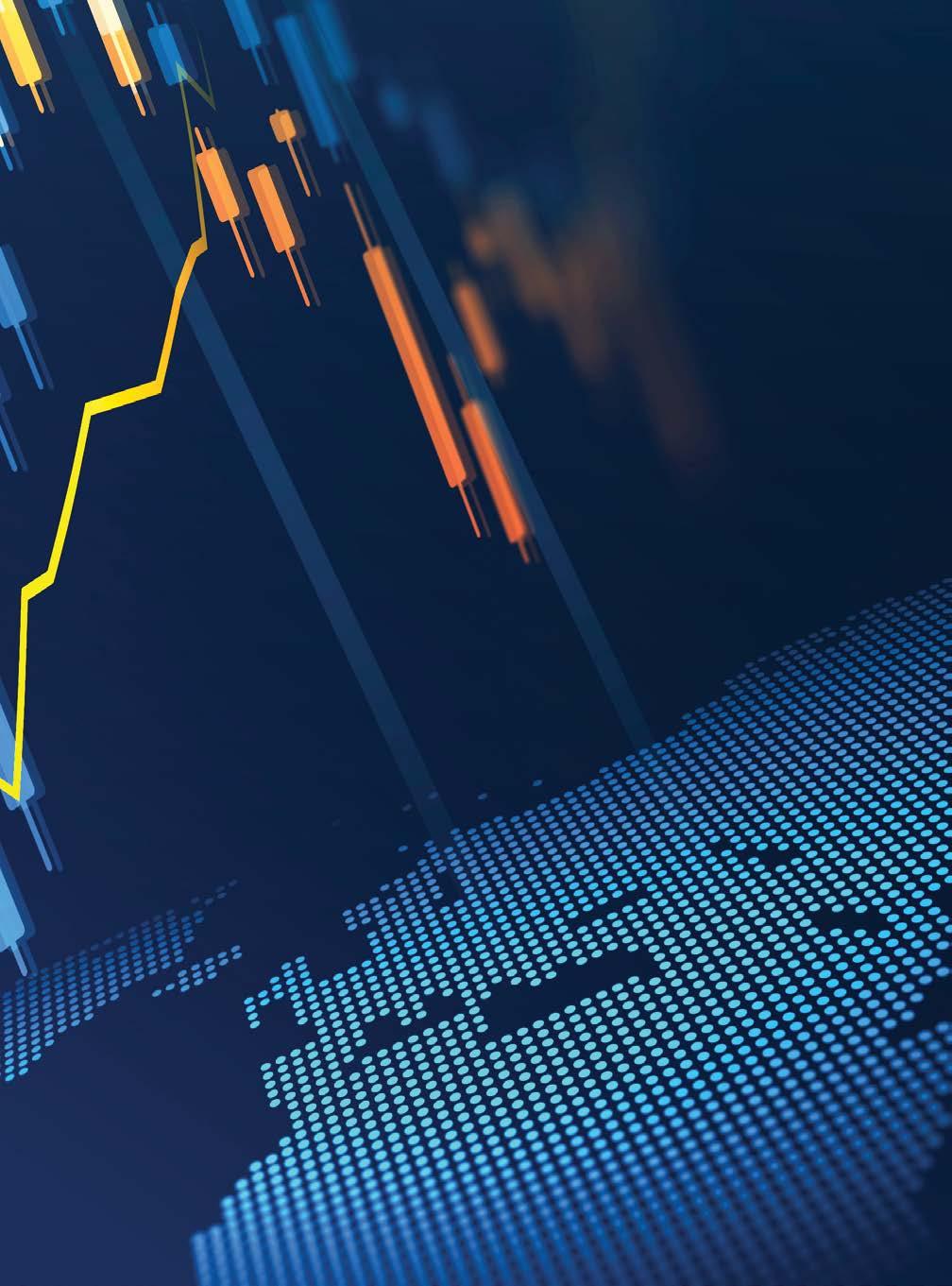


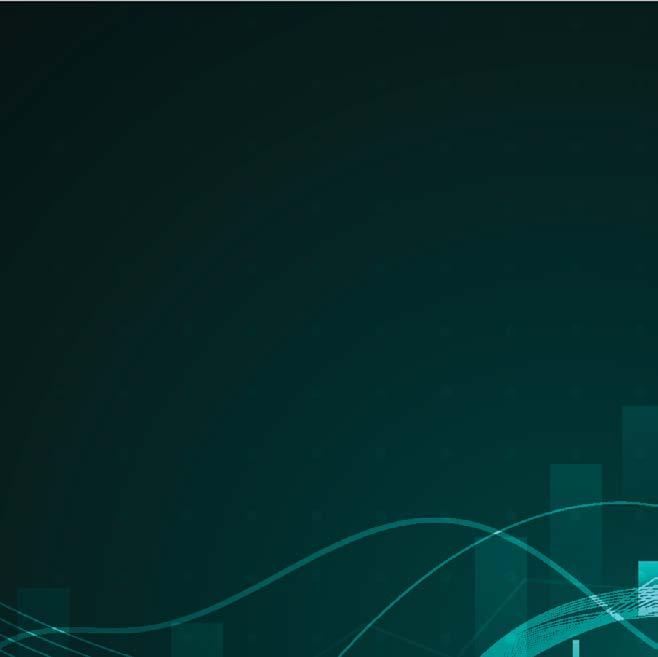
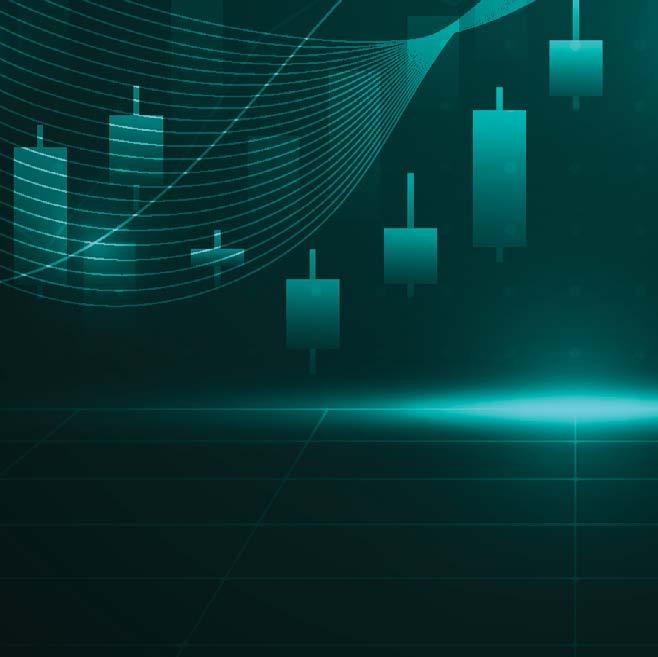


STARTUP FUNDING Investor Insights Every Entrepreneur Needs
A series of articles where the MENA region's leading venture capitalists share practical advice to help founders navigate the challenges of building and scaling a startup.
by TAMARA PUPIC

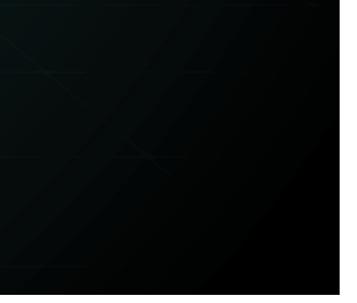
NOOR SWEID 01
AUTHOR AND FOUNDER AND MANAGING PARTNER AT Global Ventures
What are the top three things founders should absolutely do when preparing to raise their first round?
First, be able to articulate your vision in two clear, compelling sentences. Focus on the problem you’re solving, how your solution is different, and where you see it going. This is not about having the flashiest pitch, it is about helping investors quickly grasp what you are building and why it matters.
Second, develop a strong grasp of your numbers. Even in the early days, knowing your financials and growth trajectory is non-negotiable. You don’t need to be the one building the model, but you do need to be able to speak to it with confidence. It shows you understand what drives your business and what will keep it alive. Third, tie the vision to the plan. Be clear on your strategy, where the capital will go, and how it will help unlock the next chapter of your journey. Investors want to see not just ambition, but intention. A clear roadmap can be just as convincing as the vision itself.

SECTORS TO WATCH/
Agtech is one of the most compelling areas of innovation today, especially across the Middle East and Africa. It is where urgent global needs and regional strengths intersect. With over 800 million people facing food insecurity and climate change disrupting traditional food systems, the case for agricultural innovation has never been clearer. What makes this moment exciting is that many of the most relevant solutions are being built within the region. Startups like iyris, Maalexi, and Seafood Souq are pioneering technologies tailored to our environmental realities, from solar-powered farming to transparent seafood supply chains. In parts of the region, agriculture supports more than 40% of the population. Yet the sector remains under-resourced and vulnerable to climate shocks. Agtech goes beyond improving yields to enable resilience, boost access, and create systems that work for both producers and consumers. Few sectors carry the potential to drive economic growth, advance climate solutions, and improve food security all at once, and agritech does just that.

SHANE SHIN
From your experience, what are the top three priorities for a founder getting ready to raise their first round?
Build the narrative, not just the numbers. At the early stage, we don’t expect a perfect model - we’re looking for a clear, compelling story about why now, why you, and why this problem. Founders should be able to communicate their vision in a way that transcends slides.
Validate with velocity. We love seeing founders who have spoken to 100+ users, tested different
SECTORS TO WATCH/
We’re incredibly bullish on AI infrastructure and applied AI, particularly solutions built from the region for the world. We’re seeing founders in MENA tackling real-world problems in logistics, fintech, and education using edge AI, vertical models, and hybrid compute strategies.
As the region becomes a launchpad - not just a market - we believe MENA has the potential to create globally relevant AI companies. At Shorooq, we’re backing that future with capital and conviction.
go-to-market strategies, and gathered real-world proof points - even before product maturity. Momentum matters more than polish. Research your investors. Don’t send mass emails. Tailor your approach. Know which fund stage they focus on, their ticket size, and what value they add. This signals seriousness and respect for time.
‘T/Funding
EKTA TOLANI 03
CHIEF INVESTMENT OFFICER,
SECTORS TO WATCH/ W
hat startup sector or trend are you most excited about right now—and why? This is a tech economy where everything is AI, although sector wise, we are excited about longevity which we think has a decade of growth ahead. We are excited about healthtech and believe AI will bring some groundbreaking solutions to many medical conditions. We absolutely love B2B SaaS as these businesses have a high probability of success and profitability. We see tremendous growth in the gaming segment, given how it is penetrating beyond entertainment into education, and healthcare.

Please name three non-negotiables for founders preparing for their first fundraise. To a founder, I would say they should focus on creating a solid pitch deck that narrates your story, showcases your product, and clearly highlights the market opportunity. Second, know your business in and out, your unit model, key
economics driving your revenues and profitability, product market fit, and GTM. Have financials and projections in order that align with the narrative. Third, do a good amount of homework on your potential investors who align with your vision and can bring the right kind of support and network.
What three things can make or break a founder’s first fundraising round?
Understand whether or not you are building a business that actually requires venture funding.Everyone’s raising money these days, but not every business should. Before jumping into the process, founders need to ask: Do we really need venture capital? Is this a business that requires significant upfront investment to scale rapidly? Or is it something that can be bootstrapped, financed through revenue, or built with venture debt? Once you’ve answered that, the second part is knowing your story: Why you? Why now? And why is this a big enough opportunity to warrant venture funding? Pre-Seed and Seed stage investors are investing in people above all else; make sure your why is clear and your story stands out. Benchmark intelligently, then raise to reach clear milestones. Once you’ve decided to go the VC route, don’t just raise arbitrarily. Look at comparable businesses in your sector and your stage. What kind of traction or KPIs did they have when they raised their seed? If you’re in FinTech, for example,

what were the annual recurring revenue (ARR) levels, customer counts, or engagement metrics at each round? Use those benchmarks to model out what you need to get there, and raise the capital required to hit those targets, whether that’s team, tech, go-to-market, or regulatory. Founders have to demonstrate an understanding of how to use funds to scale efficiently. Raising funds should always be driven by a desire to reach specific targets. Once those targets are achieved, you either raise further funds or, in some cases, you’ve achieved profitability and can invest from your own balance sheet.
Cast a wide net, but stay intentional. You should speak to as many investors as possible, not just to land a cheque, but to gather feedback, sharpen your pitch, and pressure test your model. But that doesn’t mean taking just any money. Founders should always prioritize alignment: who’s adding strategic value, who understands your market, and who you’d actually want on your cap table long-term. Every round is a step toward the next. Choose the right partners early.
SECTORS TO WATCH/
t’s less about a “hot” trend for us and more about a consistent thesis we’ve leaned into over the past five years: business-to-business (B2B) infrastructure across emerging markets.In the post-COVID investment wave, a lot of capital went into businesses that, frankly, weren’t built to last. But there were also incredibly strong companies that used that capital well, adapted, and built durable, profitable models. And what many of them had in common was that they were business-to-business (B2B) at their core.
In emerging markets, where traditional institutions often fall short, we see huge value in startups that enable other businesses to operate more efficiently, whether that’s through lending, insurance, payments, hiring, or operational tools. These companies are stepping in where banks, consultants, and legacy providers don’t show up. That’s where we’ve found the most opportunity. To be clear, we’re not anti–consumer. Some of our best performers are direct-to-consumer (D2C). But coming out of 2020–2021, we took a step back, paused new investments for 18 months, and focused on backing our existing portfolio. When we returned to deploying capital in new startups, we doubled down on businesses that make the backbone of the economy more efficient. That lens still guides our strategy today.
‘T/Funding
What should every first-time founder absolutely get right before approaching investors?
Founders should start by clearly articulating the problem they’re solving and why now is the right time to solve it. The sense of timing and urgency is often what differentiates a compelling pitch from an average one. They should also come prepared with a solid understanding of their numbers. You don’t need to build out a full-blown financial model, but you do need to know your burn rate, your assumptions around customer acquisition, and how much you’re raising relative to the milestones you plan to achieve.
Moreover, it’s important to approach fundraising as a relationship-building process. Take the time to research which investors are the right fit for your stage and industry. Reaching out with a tailored message shows professionalism and sets the tone for future interactions. Lastly, founders should listen carefully to the feedback and use it to validate or enhance the business model.
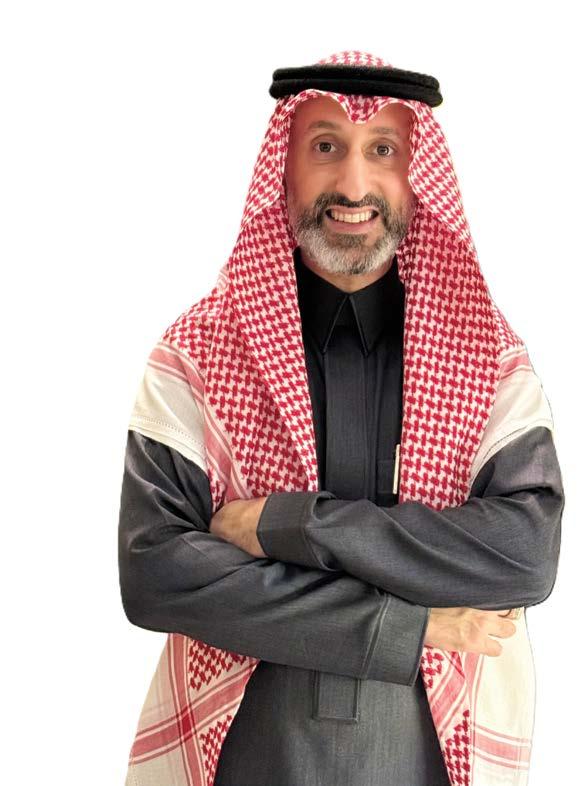
SECTORS TO WATCH/
We’re particularly excited about fintech, including proptech and insuretech, where there’s still plenty of room for innovation in the region. AI solutions are of course a key area of focus, especially those with localized applications and strong commercial potential. Logistics is also undergoing massive transformation, with startups using tech to solve infrastructure gaps in a scalable way.
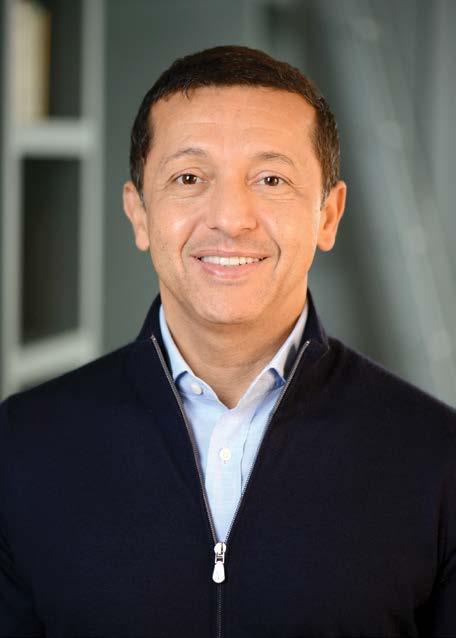
SECTORS TO WATCH/ W
e’re entering a phase of unprecedented efficiency and precision in solving complex problems—driven by advances in AI. The next wave of breakout companies will combine deep domain expertise with intelligent tools that deliver tailored, high-impact solutions to each customer. Strong founders now have the opportunity to tackle more intricate challenges in financial services, logistics and supply chain, healthcare, and enterprise workflows—areas still riddled with friction, inefficiency, and offline processes. This isn’t just about automation—it’s about reimagining how real business gets done.
What must founders get right before their first raise?
Craft a compelling story. Fundraising is about authentically communicating a clear, compelling narrative. Show that you are a founder building a company and not just a transaction. Great founders weave their data into a broader vision— showing us the urgency of the moment, the power of the solution, and their personal edge in bringing it to life.The best founders articulate not just what they’re building, but why now, why this solution, and why they are uniquely positioned to lead it.
Know your business inside and out. Investors don’t expect perfection—but we do expect precision. Great founders are fluent in the fundamentals: market dynamics, customer behavior, revenue model, unit economics, and the competitive landscape. They answer questions thoughtfully and with depth. If you can’t clearly articulate the key drivers of your business, it’s hard for us to believe you’ll know how to steer it.
Target the right investors. Not every investor is the right fit—and that’s perfectly fine. Smart founders treat fundraising like matchmaking: they identify investors aligned with their stage, sector, and geography, and tailor their outreach accordingly. The fact is, only 2–5% of conversations turn into a check. Warm introductions significantly boost those odds. It’s a numbers game, so make sure you have a suitable and extensive list based on your fundraising goal.
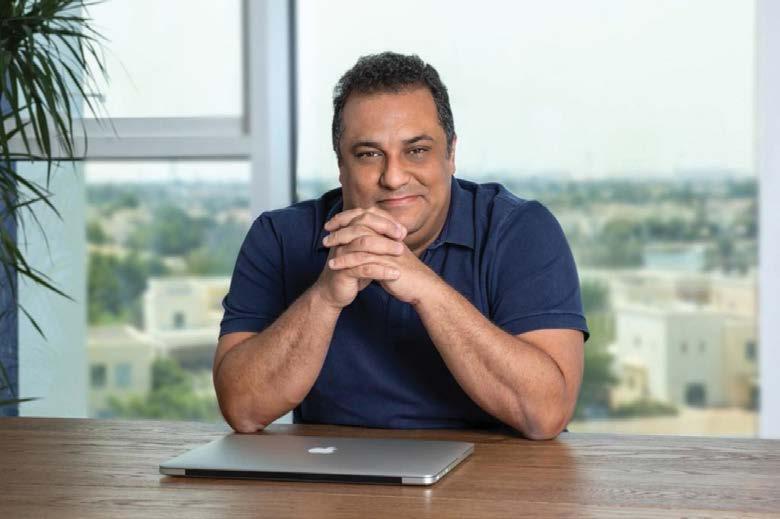
BASIL MOFTAH
What are the biggest do’s for a first-time fundraise?
Get your house in order: Clean cap tables, clear documentation, and a sharp understanding of your business basics make you way more credible to investors. Lots of early deals get slowed down just because basic paperwork is missing.
Build a real fundraising strategy: Don’t just randomly reach out. Look up investors who fit your stage, industry, and location, and be clear about the story you want to tell about your product, team, and market. Stalk your investors (in a good way!): Chat with other founders who’ve taken their money. See if the GP’s vibe, ethics, and actions actually match their “founder-friendly” talk—a lot of them say it but don’t always walk the walk when the going gets rough.
SECTORS TO WATCH/
We’re very excited about fintech infrastructure and B2B SaaS in MENA. Both are at an inflection point. Fintech: With regulators opening up banking and payments, there’s a wave of startups digitizing everything from SME lending to crossborder payments. B2B SaaS: Companies in the region are finally building products with global relevance, not just local. The next five years could see true category leaders emerging from MENA in areas like AI-powered analytics, workflow automation, and vertical SaaS.
HASAN 08HAIDER
What are the essentials for raising your first round?
Read, a lot. There’s an overwhelming amount of high-quality content out there, blog posts, podcasts, guides, even tweets, from founders, investors, and operators who’ve been through the process. You don’t need to reinvent the wheel, but you also can’t afford to walk into a fundraise unprepared. The founders who take the time to study the journey, understand investor expectations, and learn from other people’s mistakes tend to move faster and make fewer costly errors. Build a solid deck and story. Your pitch isn’t just slides, it’s the narrative of why your startup deserves to exist. A strong deck tells a story that flows: the problem, why it matters, how you’re solving it, why you’re the
right team, and where this can go. Founders often underestimate how much clarity and simplicity matter here. If investors walk away unsure what you do, or unconvinced why it’s exciting, you’ve already lost them.
Leverage your network for warm introductions. Fundraising is as much about who brings you into the room as it is about what you’re building. Investors are bombarded with pitches; the ones that come via trusted referrals naturally get more attention. Tap into your advisors, angels, fellow founders, and mentors, these introductions can dramatically increase your chances of getting a real look, not just a polite pass. Get these three things right: knowledge, story, and access, and you’ve already improved your odds of running a successful raise.

SECTORS TO WATCH/
We don’t chase sectors or trends just because they’re perceived as hot. By the time something is being talked about as the “next big thing,” it’s usually already too late from an investment perspective: valuations are inflated, competition is fierce, and the best opportunities have been picked over.
Right now, everyone is talking about AI. But instead of diving headfirst into hype-driven deals, we’ve taken a more disciplined approach. We waited until we saw real founders building real companies, where AI isn’t the story in itself but a tool in their arsenal: something that makes the business stronger, smarter, and more defensible. That’s the kind of application we find exciting, because it’s grounded in execution rather than noise.
Instead, our focus has always been on the founders themselves. If you back exceptional founders with the ability to execute, they’ll often create the trends rather than follow them. And by staying disciplined on that approach, we often find ourselves invested in companies well before the hype cycle begins. That’s where the real opportunity lies: supporting great teams early, and letting the market catch up later.
The Executive Selection
THE PANTHÈRE MATELASSÉ BAG →
Cartier's panther lends its distinctive image to the Maison's latest bag.
The bold imprint, designed by the Maison’s creative studios, takes the form of haute couture quilting that slashes across the bag. A new feature for Cartier, this quilting enhances the feel of the motif. The pattern shapes the bag and is in harmony with the clasp bearing the image of the Maison's favorite animal. It's all in the details, a series of surprising touches, including interior compartments, a flat pocket, a signature pocket and a removable mirror. A symbol of style and character, the panther captivates in this new limited-edition version, which can be worn over the shoulder or carried by hand, and for which Cartier has selected an intense black shade. int.cartier.com
From better goods to better wardrobe bests, every issue, we choose a few items that make the approved executive selection list. In this edition, our picks are from Cartier and M&S.


THE BALLET PUMP IS BACK →
By M&S
Ballet pumps are making a graceful return, especially elegant pointe-style ballet pump. Available in versatile color ways and prints – classic Blush, studded black, Snake Print and Khaki. The ballet pump has long been a favorite of stylish women who know the power of a beautifully classic shoe, and long may it continue with this contemporary rework of a much-loved style. marksandspencer.com

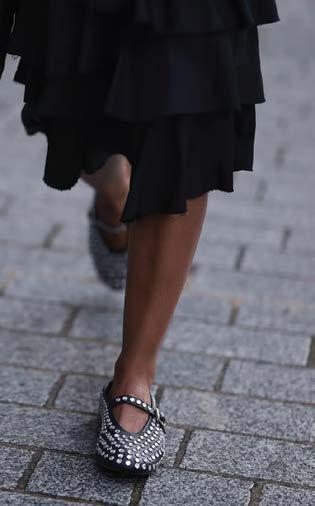




Invests In Entrepreneurs


Roots and Realms
Having left Ethiopia at a young age, Kanessa Muluneh grew up in the Netherlands and went on to create multiple startups. Yet it was in the UAE that the serial entrepreneur reconnected with her homeland and culture–a moment of serendipity that sparked the creation of the first full-scale African-inspired battle royale game, Rise of Fearless.
by AALIA MEHREEN AHMED
→ Kanessa Muluneh is the founder of Rise of Fearless, a UAE-based mobile gaming platform that merges African storytelling with immersive battle royale gameplay.
S/Idea
At the heart of a virtual quest that takes players through lush forests, quaint villages and scenic savannas –all inspired by the unique terrains of Ethiopia and the wider African continent– Dubai-born mobile gaming platform Rise of Fearless incorporates elements of a significant battle that took place in the year 1896: the Battle of Adwa. What ended as a rampant victory of the Ethiopian army over the invading Italian forces not only later led to the rise of anticolonial movements across Africa, it is also what Rise of Fearless founder Kanessa Muluneh today believes is one of many lesser known facts that can turn around the prejudiced connotations attached to Africa and its culture. “Africa’s global image has been damaged for decades,” Muluneh laments. “If you Google anything about Africa, it’s mostly negative. War. Poverty. Corruption. That’s the narrative people are used to. So when I created this game, I wanted to flip the script. Rise of Fearless is African. But more than that, it’s something positive that comes from Africa, and represents Africa in a way we can actually be proud of. It’s organized. It’s beautifully built. And, it’s rooted in powerful history. That’s why we chose the Battle of Adwa as the core of our Battle Royale storyline. This wasn’t just any moment in history; it was the moment Ethiopia fought off colonization and won. The only African country that was never colonized. So for me, this battle isn’t just a story, it’s THE story. It’s the reason we’re not just building a game, we’re building a movement. I want African youth to see themselves
→

“
If you Google anything about Africa, it’s mostly negative. War. Poverty. Corruption. That’s the narrative people are used to. So when I created this game, I wanted to flip the script. Rise of Fearless is African. But more than that, it’s something positive that comes from Africa, and represents Africa in a way we can actually be proud of.”
as heroes. I want them to feel proud when they play. And I want non-Africans to align with that energy too, to join in and feel what it’s like to win on the side of Africa, for once. The inspiration came partly from Black Panther, finally seeing a powerful, African hero on screen. No suffering, no stereotypes. Just power, pride, and purpose. That’s what we’re bringing.”
Indeed, through its offering of an intense, skill-based battle royale combat that is deeply rooted in Africa’s heritage and history, the game was launched officially in the UAE in April 2025 as a free-to-play mobile experience to ensure accessibility to a broad audience. Within the first two months of going to market, the game had been downloaded by 3,000 unique users. And already, the brand has a next plan of action for growth: to integrate Web3 technology and allow players to own in-game assets, earn rewards, and participate in a secure digital economy. “My biggest vision for Rise of Fearless is huge: I don’t just want it to be one of the biggest play-to-earn games out there; I want it to be the biggest, period,” Muluneh declares. “It’s built on blockchain because I believe that’s where the future lies, especially for emerging markets like Africa. And when it comes to embracing Web3 and everything crypto-related, no place does it like the UAE. That’s what makes it the perfect hub. It bridges the gap between innovation and accessibility, two things we absolutely need to build a successful play-to-earn ecosystem. My focus is on emerging markets, Africa first, but Asia is next. And again, the UAE connects it all. It’s a melting pot of nationalities, cultures, and ambition. Diasporas come here to build a better life, to hustle,
As part of its future roadmap, Rise of Fearless plans to integrate Web3 technology and allow players to own in-game assets, earn rewards, and participate in a secure digital economy.
to win, and I want Rise of Fearless to support that. This game is not just for entertainment; it’s meant to add real value. It can become a real income stream for players. It can build community, both here in the UAE and across the world. And that community is for everyone.”
Beyond the technological strides, Muluneh points out another aesthetic feature about the game that seals its Africa-centered storytelling. “Our characters are nonWestern,” she says. “They’re based on African history. We made sure the game represents people who are usually left out, people who never see themselves in these kinds of stories. We fixed that…finally.”
Muluneh’s efforts in fixing the narrative surrounding Ethiopia and other African countries, however, stem from her own experiences of growing up as an immigrant in Europe– after escaping the civil war in her country. “I was born in Ethiopia and raised in the Netherlands where we moved when I was three,” she says. “So I grew up in the West, but inside our home, it was a completely different world. Like most kids in immigrant families, there was always this tension between life at home and life outside. The cultures couldn’t be more different. I just wanted to fit in. I wanted to be like my friends. But at the same time, I wanted to make my parents proud. That shows up in everything, not just the way we lived, but also in the choices I made for my future. I went to medical school, even though I never
wanted to be a doctor, lawyer, or anything they had in mind for me. I had my own dreams, but back then, there wasn’t much room for creative paths. And then outside the house, I faced a whole different kind of pressure. “Why does your food smell like that?” “Why is your hair braided like that?” Those questions came up all the time. My friends had long, blonde hair. Mine wasn’t like that. My mom braided it to keep it neat; that’s how we manage our hair in our culture. I didn’t get it back then. It felt like I was caught between two worlds. I struggled a lot with identity, especially during my teenage years. It was hard. But I don’t share this to play the victim – because all of that made me who I am today. It made me stronger. Stronger than most of the people I grew up with.”
A major turning point in Muluneh’s relationship with her homeland came courtesy her move to the UAE three years ago. “When I moved to Dubai, it was the first time I truly reconnected with my African roots,” she says. “There’s a strong African and Ethiopian community here, and for the first time, I felt seen. I started relearning my language, now I speak it fluently, and I keep flying back to Ethiopia every few weeks. It’s so close to Dubai, and it suddenly felt like home wasn’t so far anymore. That connection answered a lot of internal questions I carried for years. Growing up as an immigrant, you live with two identities, and I finally let go of the one that wasn’t mine. I fully embraced
the original one. And of course, as a business-minded woman, I started exploring what that meant for my work too. I noticed something powerful: Emiratis and Arabs, in general, are some of the biggest investors in Africa. That lit a fire in me. I thought, if they see the value in Africa, why shouldn’t I? So I decided to follow that path too.”
Indeed, it was that moment of realization that first led Muluneh to invest her efforts in creating and growing Rise of Fearless. “From there, I launched Nyle, an investment firm for the African diaspora,” she adds. “The goal is to help other diasporas do the same, invest back home. We have 54 countries in Africa, and every single one has potential. As I always say: Africa’s time isn’t coming.. it’s already here. Dubai connected the dots. The game is just one example of how fast things can move when you lean into your roots and take action.”
Rise of Fearless, however, isn’t Muluneh’s first rodeo in the world of entrepreneurship. At the age of 22, when she was still in medical college (a path that she argues was “was never my thing”), Muluneh developed a medical services platform that she later sold for US$500,000. After that she went on to successfully launch and sell four other ventures, including The Queen’s League, the first women’s football league in The Netherlands, and Sporthy, a social media platform for fitness. “In today’s world, people love to
box themselves into industries –like you have to pick one and stick to it– but I never did that,” she says. “I never specialized in any industry. For me, it was always about one thing every business actually needs: marketing. From a young age, I understood one hard truth: if you want something, you’ve got to convince, position, and sell. That’s how the world works. So I focused on mastering that. While I was in medical school, I became obsessed with psychology. I wanted to understand how people think, what they do, and why they buy. I took that knowledge and translated it into marketing. I don’t care what the product is or what industry it’s in. I care about the problem it solves. I study the people who have that problem, and I either make them aware of it or I create the urgency they didn’t know they had. That’s it. I don’t do categories. I do solutions. I find the problem, build the solution, and market it. Over and over again. If I can do those three things, spot the problem, build the solution, and sell it, it always works. Always.”
Such keen attention to detail has helped Muluneh adopt the right next steps of action for Rise of Fearless too, particularly in terms of funding. “Having raised and invested capital across different sectors, I understand what investors look for - that’s why we built a strong brand presence before we launched the product,” she explains. “We’ve successfully secured our initial $700,000 in funding through a private }}
investor as a loan structure, which gives us the runway to execute our vision. What’s strategic about our approach is that we haven’t deployed these funds yet - we’re being intentional about timing. When we do, 25% will go toward game development and the remaining 75% toward marketing. That might sound marketingheavy, but that’s our edge and where our competitive advantage lies. The early traction we’re seeing —over 3,000 downloads in under two months— proves this brand-first strategy. Based on how our upcoming marketing campaigns perform, we’re planning to raise $5-10 million later this year to scale across Africa and into Asian markets.”
To bring these goals to fruition, Muluneh has found the near perfect launchpad in Dubai. But the founder also, very honestly, notes that not all that glitters is gold. “Being a founder or business owner in Dubai or anywhere in the UAE is not for the weak,” she says. “Yes, some things are easier here, but the pace is intense. The opportunities are non-stop, and while that’s a blessing, it can also be overwhelming. For someone as ambitious as I am, it’s hard to stay still. Focus becomes a daily discipline, because every five minutes there’s a new door opening, a new venture calling. But I stay grounded by reminding myself how rare this level of access is. There are parts of the world where opportunities like this don’t even exist. What I love about building Rise of Fearless here is how natural the connection feels.

FROM A YOUNG AGE, I UNDERSTOOD ONE HARD TRUTH: IF YOU WANT SOMETHING, YOU’VE GOT TO CONVINCE, POSITION, AND SELL. THAT’S HOW THE WORLD WORKS. SO I FOCUSED ON MASTERING THAT.”
Africa isn’t foreign in this region. Africans know the Middle East, and Middle Easterners know Africa. Our histories are deeply intertwined. There’s mutual respect. No judgment. No pity. None of the negative PR or outdated stereotypes you often face in the West. That changes everything. Being a founder of a game that represents Africa feels powerful here. What stands out the most is that I can run it as a business. Not a charity. Not some “impact” side project.”
Empowered by a landscape that focuses primarily on intent and ideas, Muluneh is now gearing up for the next phase of growth for Rise of Fearless. “The Web3 integration is being built as we speak,” she ays. “We plan to launch it by the end of this
year or early next year at the latest. We’re also adding upgrades to the game itself. Not because the first version was not meant to be perfect, but because we prioritized visibility first. My team and I focused on getting the name out there. Build a community. Prove that people would show up. And they have, with over 3,000 downloads already. Now it’s time to level up.”
“The bigger vision? Within the next 12 to 24 months, Web3 will be fully rolled out,” Muluneh continues. “But adoption is about more than tech; it’s about education. So we’ll be focusing on that too, making sure people understand what they’re stepping into. Web3 has the potential to change everything, especially for Africa. Right now, the
continent isn’t financially connected; there’s no Stripe, no PayPal. Crypto can bridge that. It can create true economic inclusion and bring Africa into the global digital economy. Big things are coming, and we’re working toward some exciting milestones. I’m grateful for the support and expectations people have - it motivates us to keep pushing forward, though I know there’s still so much to learn.”
And underscoring all of these ambitions is the clear-cut vision Muluneh alluded to earlier. “I want Rise of Fearless to go head-to-head with the biggest names in gaming,” she declares. “I want it to dominate the region. And I gave myself five years to get there. And knowing how I move… We’ll probably get there sooner.”
↑ Rise of Fearless builds gaming community of 2,500+ players united by African heritage and battle royale action

/Wellness
The Wellness Tech Revolution Is Here: Data, Sleep, and AI Are Reshaping Health
The wellness industry is undergoing a seismic shift - and Aaron Illathu , Managing Director at media agency Jack Taylor, has a front-row seat. “We’re living through a quiet revolution,” he says. “One that’s
by JUSTIN HARPER
measured in heart rate variability, mapped through sleep cycles, and tracked by glucose data. The era of green juices and gym selfies isn’t over, but the focus has moved to something far more powerful - data.”
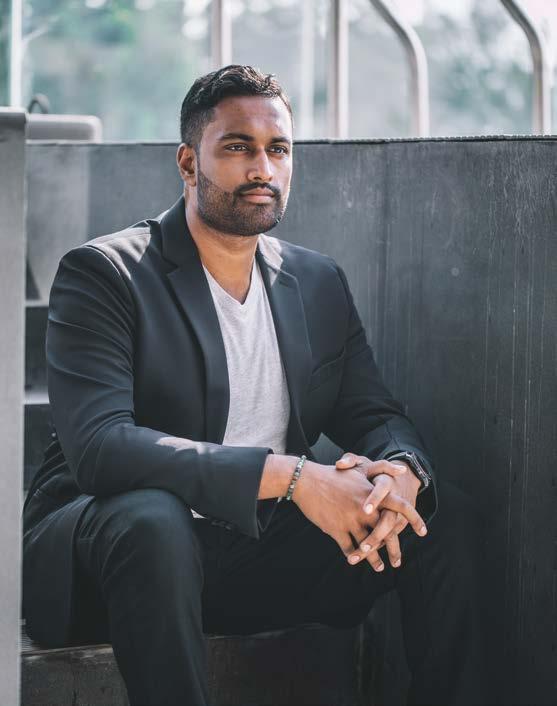
According to the Global Wellness Institute, the wellness economy is expected to hit US$8.5 trillion by 2027, up from US$5.6 trillion in 2023. More strikingly, health optimisation is now growing faster than traditional healthcare.
“Consumers aren’t waiting until they get sick,” Illathu explains. “They’re looking for performance, prevention, and personalization — and they expect technology to deliver it.” And the Middle East? Illathu believes the region isn’t just catching up - it’s on track to lead.
From Hacks to Hardware: What’s Actually Working
Illathu is quick to cut through the noise. “The most transformative wellness technologies aren’t gimmicks - they’re systems that create feedback loops to track, understand, and adapt to the body,” he says. Globally, over 1.1 billion wearables are in use, with the market projected to surpass US$150 billion by 2029. A staggering 87% of owners use them to track health metrics such as heart rate, workout duration, and sleep quality, and 60% of households now own at least one device.
“Look at Eight Sleep,” Illathu says, referring to the company’s high-tech mattress system. “It’s not just about
↑ Aaron Illathu, is the Managing Director at media agency Jack Taylor.
comfort - it regulates body temperature in real time, optimising deep sleep and REM. That’s not a luxury; that’s recovery science.” He also points to WHOOP, the strap-based tracker popular with elite athletes. “It tells you how recovered you are, how much strain you can handle, and when to push or pull back. It’s a readiness tool, not just a fitness fad.”
Other examples are Levels for glucose tracking, InsideTracker for blood biomarker analysis, and Oura for predicting illness and tracking recovery. “Five years ago, this kind of insight would have required a lab, a team of analysts, and a PhD to interpret. Now it’s in your pocket,” Illathu says.
Why the GCC Is Ready to Accelerate
One of the reasons Illathu is bullish on the Middle East is its unique position in the global market. “In places where you don’t have entrenched systems, innovation moves faster,” he notes. “The GCC doesn’t have the same legacy healthcare infrastructure as the West - and that’s a huge advantage no one talks about.”
With Saudi Arabia’s Vision 2030 and the UAE’s National Strategy for Wellbeing, billions are being invested in smart cities, AI-powered clinics, and public health programmes. “They’re not patching old systems,” Illathu says. “They’re building from scratch, and that’s where innovation thrives.”
Demographics are another factor. “You have a young, tech-savvy population, growing health consciousness, and a luxury-first mindset. That’s a perfect storm — demand meets ambition meets capital.”
He notes that brands are already entering the region with partnerships in clinics offering biological age testing, stem cell therapy, and longevity-focused IV treatments.
“These aren’t fringe services anymore,” he says. “They’re becoming status symbols. In the 1990s, it was luxury
cars. Now, bio-tracking wearables are the new badge of success.”
What Comes Next: Longevity, Predictive Health, and Human Optimisation
For Illathu, the most exciting frontier isn’t fitness — it’s longevity. “This isn’t just about living longer; it’s about extending your healthspan — the years you can perform at your best,” he says. Thanks to AI, longevity is no longer reserved for billionaires. Diagnostics, supplementation, and habit-based coaching are now widely available. He cites companies like Vieroots, which use epigenetic and microbiome testing to predict and prevent chronic disease, and Biograph, founded by longevity expert Dr. Peter Attia, which offers continuous biomarker monitoring and personalised protocols.
“What direction is your health headed? How do we catch issues before they surface? That’s the future,” Illathu says. “And for entrepreneurs, here’s your takeaway — the next billion-dollar wellness brand won’t sell a product. It’ll sell a transformation.”
What the Region Needs: Visionaries, Not Vendors
Despite the excitement, Illathu has a warning for startups entering the GCC’s wellness space.
“Ask yourself — are you solving a real human problem or just chasing a trend? Can your solution work across cultures, or is it locked into Western wellness clichés? Are you building tools that create real outcomes, or just toys that will be abandoned after a month?”
He believes the region doesn’t need more copycat fitness apps. Instead, it needs platforms that “educate, empower, and embed wellness into everyday life” — whether that’s corporate wellness dashboards, AI-driven health nudges, or smart environments that adapt to a user’s biological signals. “The opportunity is enormous,” he says, “but only for those
bold enough to go beyond the obvious.” Illathu closes with a reminder that wellness is about more than chasing the latest device or metric. “In the age of performance, health is no longer defined as ‘not being sick.’ It’s about having the energy and capacity to do what you love, without compromise.”
For the Middle East, he sees a strategic opportunity. “If we reframe wellness not as a lifestyle trend, but as a pillar of productivity and national growth, we won’t just attract global brandswe’ll create our own.” And who will shape the tech-driven wellness future? Illathu smiles. “I think the answer might be a lot closer to home than most people realise.”

Justin Harper is an award-winning business journalist and editor who has worked across four continents and for the biggest names in media, including the BBC, FT Business, Daily Mail, and others. He is the co-founder of The Crypto Radio and an experienced podcast host.
“Consumers aren’t waiting until they get sick. They’re looking for performance, prevention, and personalization — and they expect technology to deliver it. ”
Nominate Now: 2025 Tech Innovation Awards by Entrepreneur Middle East
As a celebration of the MENA region's tech and innovation ecosystem, the 2025 Tech Innovation Awards will be staged by Entrepreneur Middle East on September 25, 2025, with the event highlighting the individuals and enterprises that are shaping the future of this dynamic industry.
The deadline for nominations is September 18, 2025, and they can be submitted on the Tech Innovation Awards website in the following categories:
• Best Digital Transformation
• Logistics Company of the Year
• Best Fintech Innovation
• Healthtech Company of the Year
• Construction Innovation
• Entertainment Platform of the Year
• Best Tech Solution Provider
• HR Software of the Year
• Digital Bank of the Year
• Proptech Solution of the Year
• Foodtech Company of the Year
• Blockchain Innovation of the Year
• Ecosystem Enabler of the Year
• Best Agritech Innovation
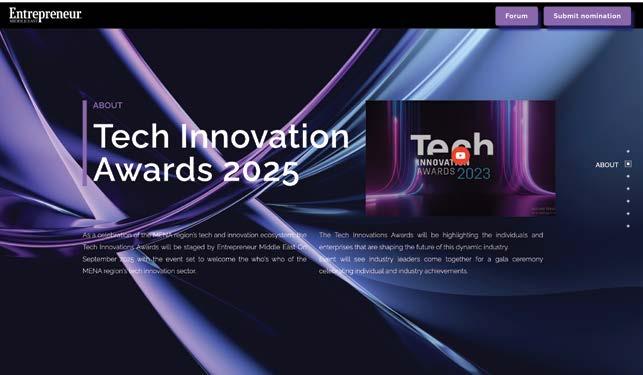





HANGZHOU
YOUR NEW ROUTE TO ANCIENT CHINA
Now you can fly Emirates to Hangzhou, one of the seven ancient capitals of China. Explore its vast history and culture, and experience the famous West Lake, an inspiration for generations of artists and poets. Fly in comfort all the way with our world-class service. Indulge in delicious regional meals and recline to hours of award-winning entertainment.


